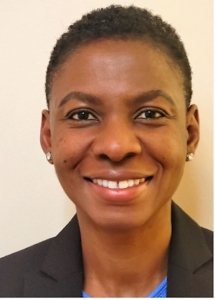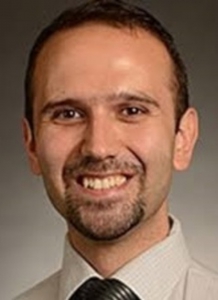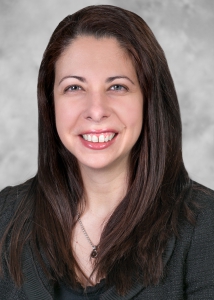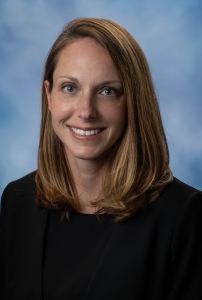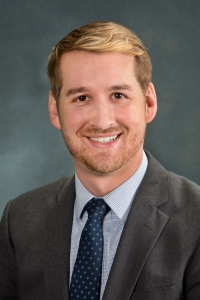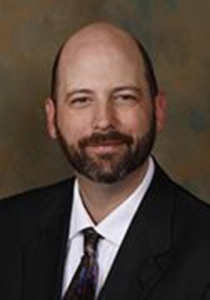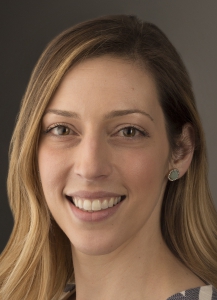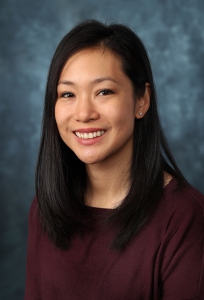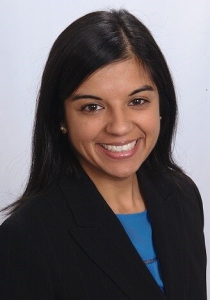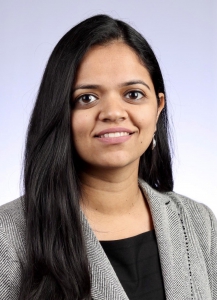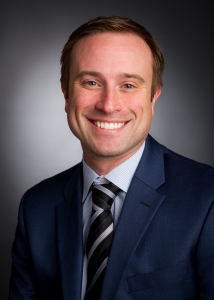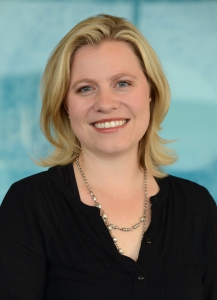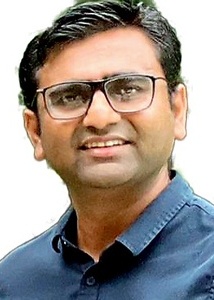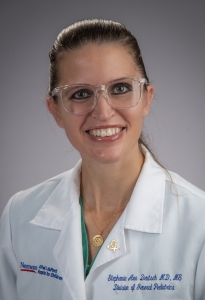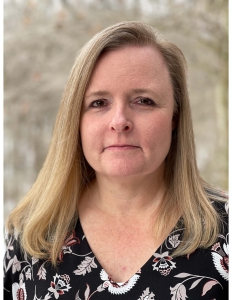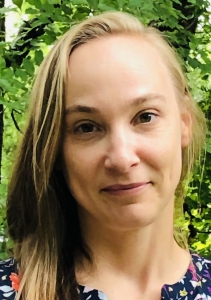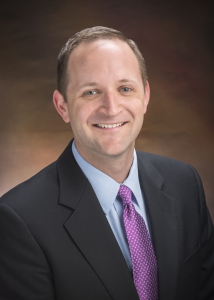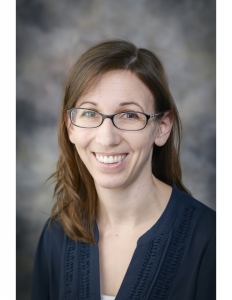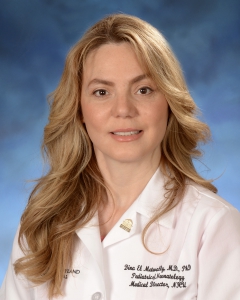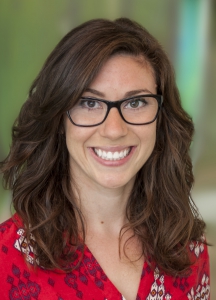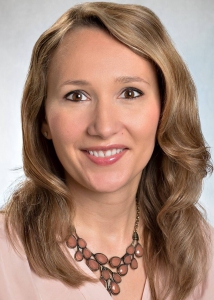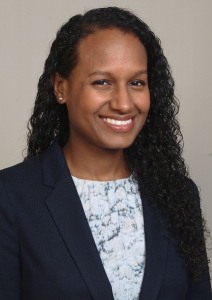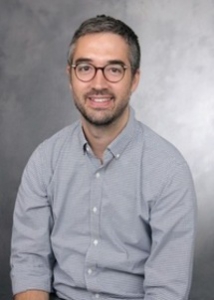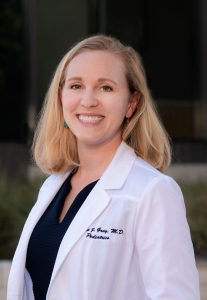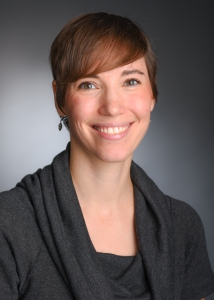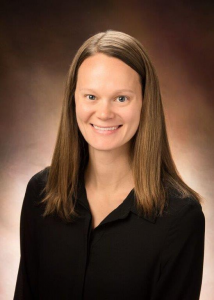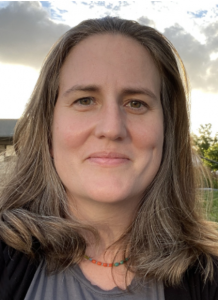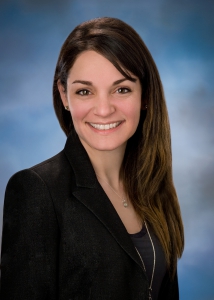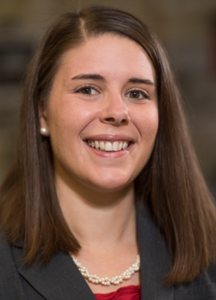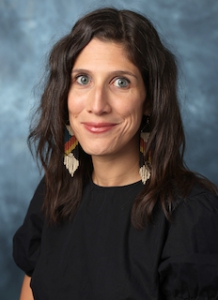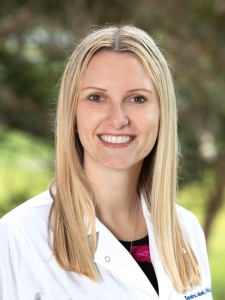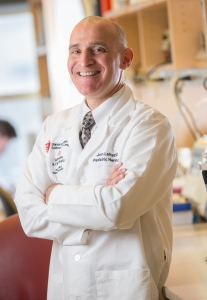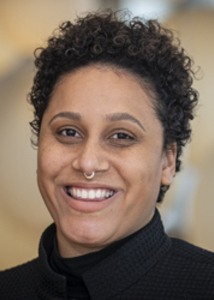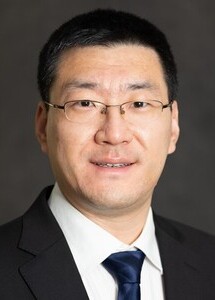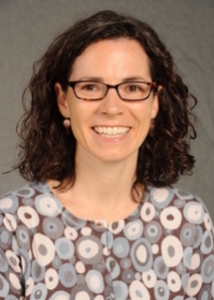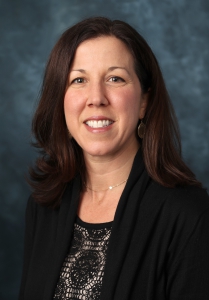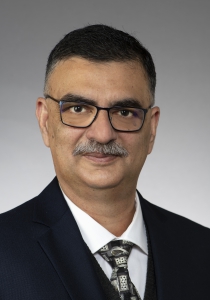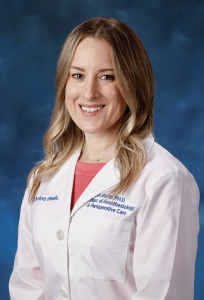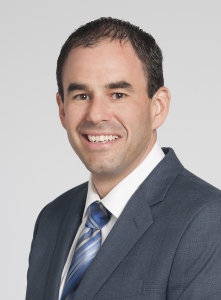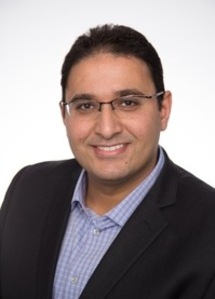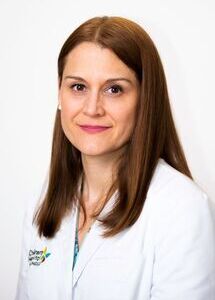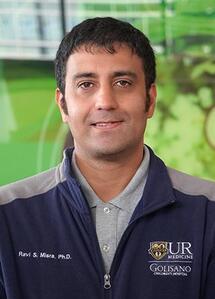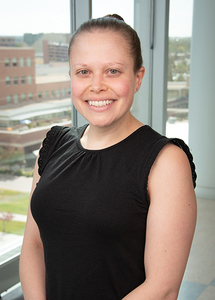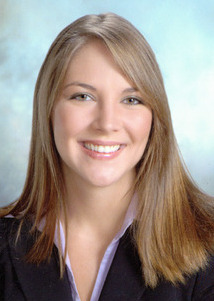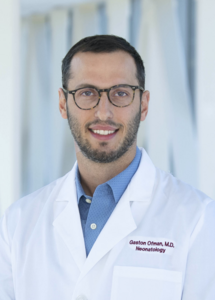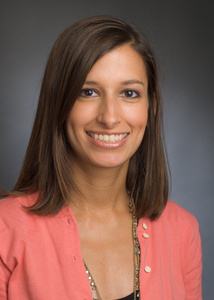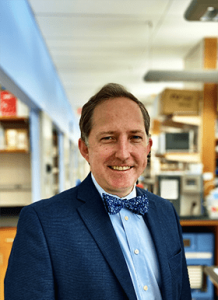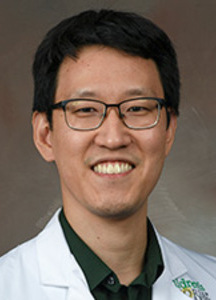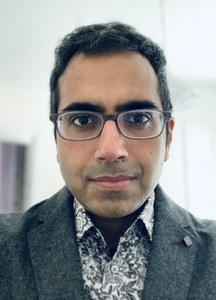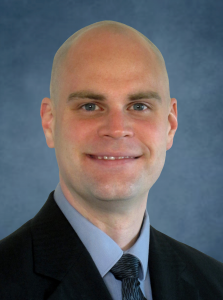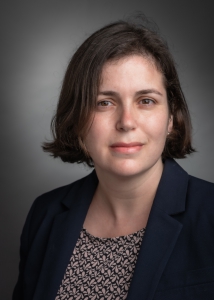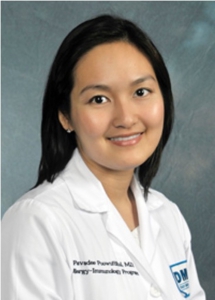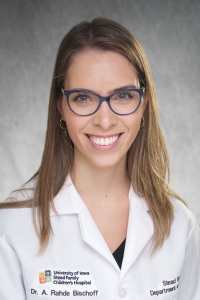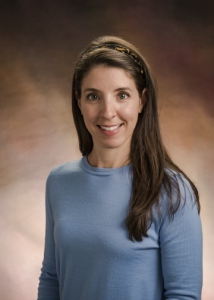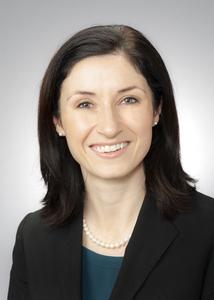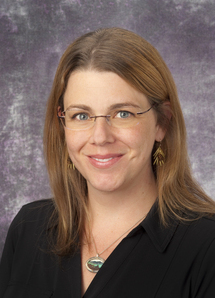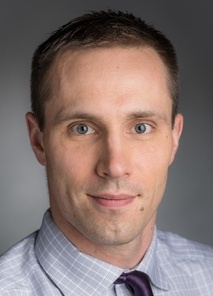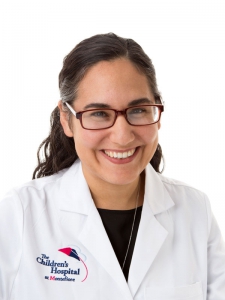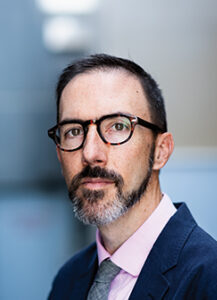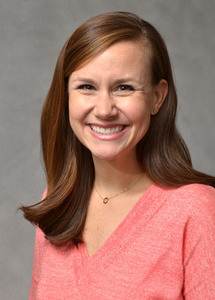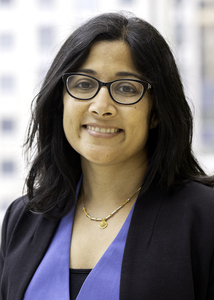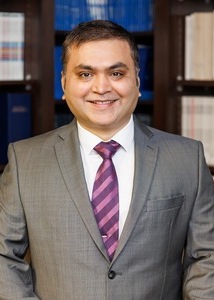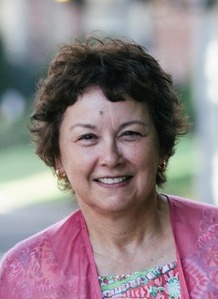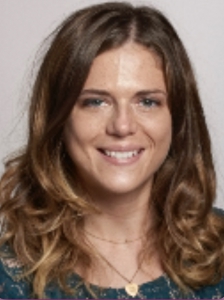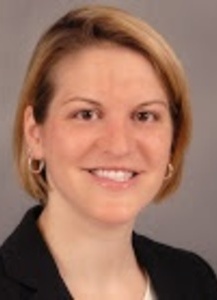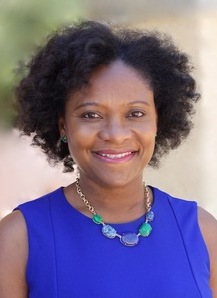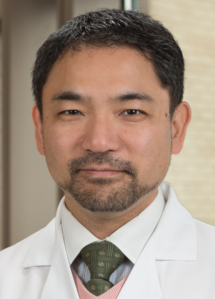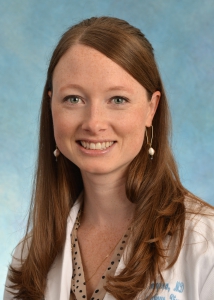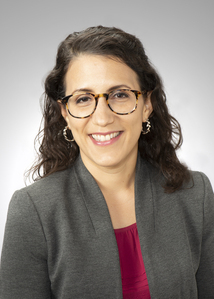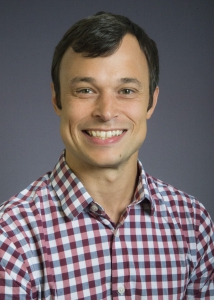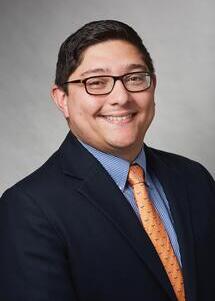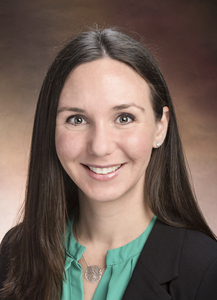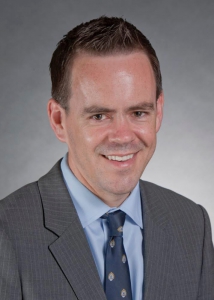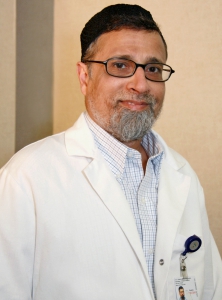Akangire, Gangaram
Children’s Mercy Hospitals and Clinics, University of Missouri-Kansas City School of Medicine
Dr. Gangaram Akangire is an attending neonatologist at Children’s Mercy in Kansas City and associate professor of pediatrics at University of Missouri Kansas City, Missouri. His research focuses on outcomes of infants with bronchopulmonary dysplasia especially who received tracheostomy. Additionally, he is interested in neonatal sepsis and utilization of neonatal sepsis calculator in decreasing use of antibiotics.
Akpan, Uduak
Brody School of Medicine at East Carolina University
Dr. Uduak Akpan is an Associate Professor at the Brody School of Medicine, East Carolina University in Greenville, North Carolina. She is a Neonatologist at the Maynard Children’s Hospital where she serves as both the Medical Director and the Quality Director of the Neonatal Intensive Care Unit (NICU). She is a clinical researcher with a special interest in the management and outcomes of extremely preterm infants. In her role as Quality Director, she has led several Quality Improvement initiatives, resulting in publications, thus adding to current knowledge regarding outcomes of vulnerable infants. Prior to assuming the role of medical director in the NICU, she served as Director of the NICU follow up clinic where she has been involved in research regarding high-risk infants, including serving as site PI for multi-center studies in the follow up clinic. She regularly reviews manuscripts and abstracts for journals and national meetings, participates and leads multiple single and multi-center studies, and mentors the next generation of pediatric and neonatology researchers.
Alsaied, Tarek
University of Pittsburgh School of Medicine, UPMC Childrens Hospital of Pittsburgh
Dr. Alsaied earned his medical degree from Damascus University Medical School, followed by his Pediatric Residency at the American University of Beirut Medical Center. He then completed an additional Pediatric Residency and Pediatric Cardiology Fellowship at Cincinnati Children’s Hospital, while simultaneously completing his Master’s degree in Clinical and Translational Research at the University of Cincinnati. Alsaied then completed an Advanced Cardiovascular Imaging fellowship at Boston Children’s before returning to Cincinnati Children’s to serve as an Assistant Professor of Pediatric Cardiology before being recruited to UPMC Children’s Hospital of Pittsburgh. Dr. Alsaied has been awarded several prestigious awards from important pediatric cardiology imaging societies including an Early Career Award from the Society of Cardiac MRI as well as a nomination for the American Academy of Pediatrics Young Investigator Award. He currently serves as Associate Editor of the journal “Pediatric Cardiology” . His research interests include imaging markers in Fontan circulation by cardiac MRI in collaboration with heart failure, hepatology and radiology; identifying new therapies for patients with Fontan physiology; and Cardiac MRI research in different diseases and settings (compress sense, 3D Cine and 4D flow). He has published over 100 peer-reviewed manuscripts, contributed to 6 book chapters, and presented his work at several major meetings including AHA and ACC.
Angelidou, Asimenia
Beth Israel Deaconess Medical Center, Boston Children’s Hospital
Dr. Angelidou is a Neonatologist at Beth Israel Deaconess Medical Center, Clinical Lead at the Precision Vaccines Program in Boston Children’s Hospital and Assistant Professor of Pediatrics at Harvard Medical School. She obtained her medical degree and doctoral degree in Immunopharmacology from the University of Athens in Greece followed by a post-doctoral fellowship at Tufts University, where she studied the role of neuropeptides secreted by innate immune cells in brain inflammation and autism. Her research expanded our understanding of autism pathogenesis and paved the way for identifying a unique neuro-immune phenotype in autistic children. Dr. Angelidou completed training in Pediatrics at the University of Texas Southwestern and Children’s Medical Center at Dallas, TX, and Neonatal-Perinatal Medicine at the Harvard Combined Training Program in Neonatology. During her Chief year of fellowship, she received the Marshall Klaus Perinatal Research Award from the American Academy of Pediatrics and has published extensively in the field of Immunology. An area of substantial contribution with direct implications for public health is the optimization of Bacille Calmette-Guérin (BCG) vaccine, the only licensed vaccine against tuberculosis (TB) and one of few administered in the neonatal period. BCG decreases infant mortality by preventing non-TB respiratory infections and sepsis, but questions remain about the immunologic correlates of BCG protection and the optimal BCG strain/formulation. Dr. Angelidou discovered: (a) that the different licensed BCG formulations, given interchangeably to ~100 million newborns worldwide each year, vary markedly in their viability and innate immune activating ability, potentially explaining variability in BCG-induced protection (Angelidou, A et al Vaccine 2020) and (b) that BCG alters the metabolic program of newborn monocytes (Angelidou, A et al Front Immunol 2021). Under the mentorship of Drs. Ofer Levy and Mihai Netea, Dr. Angelidou now has a NIH/NIAID K08 award to characterize BCG vaccine-induced off-target effects in human newborns. In her capacity as the Clinical Lead of the Precision Vaccines Program at Boston Children’s Hospital, Dr. Angelidou has participated in the design, execution and interpretation of international multi-site NIH/NIAID-funded clinical trials aiming to determine the appropriate timing of vaccine administration, discover correlates of vaccine protection in newborn populations, and optimize national immunization schemes within and outside the U.S. She has applied systems biology methods to characterize the development of the human immune system in early life, resulting in authorships in Nature Communications, Frontiers in Immunology, and Cell Reports. During the COVID-19 pandemic, Dr. Angelidou led a state-wide study to understand the epidemiology of perinatal SARS-CoV-2 infection, work supplemented by investigations of the immune effects of SARS-CoV-2 infection vs vaccination in pregnant and lactating women. With her clinical background, formal training in Clinical and Translational Science, and engagement in pre-clinical and human clinical vaccine studies, she strives to bridge translational investigation and clinical innovation to promote newborn health and improve childhood health outcomes.
Anyigbo, Chidiogo
Cincinnati Children’s Hospital Medical Center
Chidiogo “Diogo” Anyigbo, MD, MPH, FAAP, is a fellowship-trained academic pediatrician and Assistant Professor of Pediatrics at Cincinnati Children’s Hospital Medical Center. She has expertise in patient-and family-centered care, trauma-and-healing-informed approaches, and social determinants of health. Dr. Anyigbo’s research focuses on mitigating adverse childhood experiences and unmet social needs that limit a caregiver’s capacity to foster safe, stable, and nurturing relationships essential for their child’s overall behavioral functioning. Her fellowship publications focused on healthcare utilization and care coordination needs for children with adverse childhood experiences as well as the utility of the medical home in addressing the needs of children living in poverty. Dr. Anyigbo’s current KL2 scholar project (KL2TR001426) focuses on the socio-contextual influences of infant and early childhood mental health. She also leads one of 36 projects funded by the U.S. Department of Agriculture through a cooperative agreement with the Food Research & Action Center to test innovative strategies to increase participation and equity in the Special Supplemental Nutrition Programs for Women, Infants, and Children, known as WIC. Dr. Anyigbo has a record of leadership positions at regional and national levels focused on child health advocacy and is a current executive committee member on the American Academy of Pediatrics Council on Early Childhood.
Aquino, Marcella
Hasbro Children’s Hospital at Rhode Island Hospital, The Warren Alpert Medical School of Brown University
Dr. Marcella Aquino is an experienced allergist and immunologist with a strong clinical and research focus on allergic skin diseases including atopic dermatitis (AD), allergic contact dermatitis (ACD), and the cutaneous manifestations of drug allergy. She has written many articles in peer reviewed journals on these topics and presented at national, regional, and local societies. Dr. Aquino has been PI and Co-PI in pharmaceutical sponsored studies, self-initiated investigator studies and quality improvement studies on asthma and AD. Recently, her clinical research has begun to explore health care disparities that challenge disease management and increase morbidity in children with asthma and atopic dermatitis via a multi model approach seeking to identify risk and resource factors contributing to outcomes. Dr. Aquino is a clinician educator who has been actively involved in the teaching and mentoring of Allergy/Immunology fellows in training and Internal Medicine and Pediatric residents interested in careers in Allergy and Immunology. Her dedication to education is manifested by having successfully established a new A/I fellowship at Brown where she is the Program Director. Dr. Aquino has volunteered her time extensively to national allergy societies including the AAAAI where she is the current Chair of the Dermatology Committee and to the ACAAI where she is a member of the Board of Regents, Advisor to the Dermatology Committee, member of the Foundation Board, and past member of the Annual Program Committee.
Archer, Natasha
Boston Children’s Hospital
Dr. Archer is a physician scientist devoted to providing care and implementing educational and management programs for children with sickle cell disease globally. During her pediatric hematology/oncology fellowship, she provided care for pediatric patients with hematologic disorders at Boston Children’s Hospital and helped establish a sickle cell disease diagnostic and management program in rural Haiti. The experience gained from her clinical and programmatic work allowed her to pursue unique and competitive patient-oriented translational research on hemoglobinopathies and malarial infection that directly impacts the lives of her patients in both Boston and Haiti. Dr. Archer’s research involves both host red blood cell factors and acquired genetic and/or epigenetic changes to the P. falciparum genome that can guide the treatment of disease in the immunocompromised sickle cell disease individual. She has developed and optimized assays studying the effects of hemoglobin type and variable oxygen concentrations on P. falciparum infectivity. For this work, Dr. Archer has received several grants including the American Society of Hematology (ASH) Amos medical faculty development award. She published her results identifying oxygen dependent sickle hemoglobin polymerization as a major driver of sickle cell trait protection from malaria in 2018 and published her findings demonstrating no difference in P. falciparum growth in cord, hereditary persistence of fetal hemoglobin trait and normal hemoglobin red blood cells in 2019. The above studies set the foundation for her funded NIH K08 award investigating red blood cell modifiers of P. falciparum growth in sickle cell disease erythrocytes. The manuscript from this work has just been accepted (American Journal of Hematology). It demonstrates that in patients with sickle cell disease, F-cells support both P. falciparum invasion and growth. The information gained from these studies will be used to help inform how patients with sickle cell disease in malaria endemic regions are managed. Dr. Archer also has a clinical research interest in sickle cell disease associated pain. She has led retrospective clinical studies at her institution to optimize the management of acute pain in her patients with sickle cell disease. As one of the initial members of INHERENT, an international network of hemoglobinopathy focused researchers, she also helped lead the development of the clinical research forms all of which laid the foundation for the initial pilot study aimed to study genetic modifiers of sickle cell disease complications. Her focus is on pain and cerebrovascular disease in sickle cell disease.
Arnolds, Marin
University of Michigan Medical School
Dr. Marin Arnolds joined the University of Michigan as Clinical Assistant Professor in the Department of Pediatrics and Communicable Diseases in the Division of Neonatal-Perinatal Medicine in 2021. She completed her medical degree at Loyola University Stritch School of Medicine, followed by residency training in Pediatrics at Northwestern University and a Neonatal-Perinatal medicine fellowship at the University of Chicago. During her time at University of Chicago, she completed a fellowship in Clinical Medical Ethics from the MacLean Center for Clinical Medical Ethics. Dr. Arnolds is a clinical neonatologist at the C.S. Mott Children’s Hospital and a faculty ethicist at the Center for Bioethics and Social Sciences in Medicine at the University of Michigan. Dr. Arnolds’ research centers around using qualitative and mixed methods to categorize and improve communication with parents in the NICU and during antenatal consultations, as well as explore ethical questions surrounding neonates born at the margin of gestational viability.
Badawy, Mohamed
Children’s Health, University of Texas Southwestern Medical School
Dr. Mohamed Badawy is a Professor of Pediatrics at the University of Texas, Southwestern Medical Center. Before joining the University of Texas, he completed fellowship training in Pediatric Emergency Medicine at the University of Rochester. In 2004, he received the American Academy of Pediatrics: Section of Emergency Medicine, Ken Graff Young Investigator Award. From 2004-2007, Dr. Badawy has been the University of Rochester, site principal investigator for the Pediatric Emergency Care Applied Research Network (PECARN) project entitled: “Childhood Head Trauma: A Neuroimaging Decision Rule”, which enrolled over 44,000 children nationally. The goal of this decision rule was to identify children who are at low risk for clinically important traumatic brain injury (ciTBI) and do not need neuroimaging. The PECARN rule was derived and validated in large pediatric cohorts at multiple centers. From 2010-2012, Dr. Badawy has been the University of Texas Southwestern site principal investigator for the CDC funded project entitled “Study of EMS findings predictive of pediatric trauma center need” which has enrolled over 1,200 children. He was subsequently the site principal investigator for the follow-up project entitled: “Use of Mechanism of Injury for the Identification of Severely Injured Children” funded by NIH, which has enrolled over 3,000 children. The goal of this project was to determine if injured pediatric patients were being appropriately triaged to a pediatric trauma center. The identification of severely injured children in the prehospital setting is important because it is used to identify the most appropriate destination facility (e.g., a pediatric trauma center). Since 2021, Dr. Badawy has been the site principal investigator for UT Southwestern, part of the STELAR node, Pediatric Emergency Care Applied Research Network (PECARN).
Basu, Rajit
Ann & Robert H. Lurie Children’s Hospital of Chicago
After receiving his medical degree from Indiana University Medical School, Dr. Basu completed his residency in pediatrics and then a fellowship in pediatric critical care at Children’s Memorial Hospital. He subsequently began his faculty career at Cincinnati Children’s Hospital and Medical Center as a Clinical Instructor in Pediatrics and advanced to Associate Professor, serving over time as the Co-Director for the Center for Acute Care Nephrology and Associate Fellowship Program Director. In 2017 he joined the Children’s Hospital of Atlanta and Emory University School of Medicine, where he served as Research Director of Critical Care Medicine and was a lead pediatric clinician investigator (including serving as a lead during the COVID scientific response in pediatrics) – bringing CHOA into numerous large center trials and industry sponsored work. In 2022 he was recruited to Lurie Children’s as the Posy and Jon Krehbiel Chief of Critical Care Medicine, Professor of Pediatrics. Dr. Basu is internationally recognized for his research and is considered a world expert in the study of acute kidney injury among critically ill patients. His work encompasses tools for risk stratification, biomarker-based phenotyping of acute kidney injury, advanced extracorporeal renal support therapies, and novel strategies for fluid management. He has published more than 125 peer-reviewed original science papers, review articles and book chapters. His research portfolio spans across basic, translational, clinical, education, and simulation science with support from local programs, federal grants, and industry. He serves on the editorial board of several critical care and nephrology journals and on several international consensus panels for critical care nephrology. He serves on the executive board of the Pediatric AKI NEXUS and also serves in prominent leadership roles in the Society for Critical Care Medicine. In addition to being the Founder and Director of the GUARDIANS program, beginning in 2022, he will start two-year term as the President-Elect followed by a two-year term as the President of the Pediatric Section of the Society for Critical Care Medicine.
Bayer, Nathaniel
Golisano Children’s Hospital at The University of Rochester Medical Center
Dr. Nathaniel Bayer is an Assistant Professor of Pediatrics at the University of Rochester and Pediatric Hospital Medicine Attending at Golisano Children’s Hospital. He studies adaptation processes, mental health, and coping of caregivers of children with medical complexity. His work has been funded by a University of Rochester University Research Award and an Academic Pediatrics Association Young Investigator Award. He has completed the Society for Pediatrics Grant Writing Program and is currently completing a Master of Science in Clinical Investigation. Dr. Bayer’s long-term goal is to become an independent investigator who improves the health of caregivers and children with medical complexity by enhancing their families’ functioning and wellbeing. Through his current University of Rochester KL2 Clinical and Translational Science Award, he is developing and piloting a peer and emotional support program for caregivers of infants with medical complexity.
Bayrer, James
University of California, San Francisco, School of Medicine
James Bayrer, MD,PhD is a board certified pediatric gastroenterologist at the University of California, San Francisco. He obtained his medical degree and Ph.D. in pharmacology at Case Western Reserve University. He completed his residency and fellowship training at the University of California, San Francisco, where he currently serves as the pediatric gastroenterology fellowship director. The intestine represents the largest exposed surface area in the body, standing at the interface between the ever-changing luminal environment and the host. Dr. Bayrer’s laboratory is keenly interested in understanding how the gut senses and responds to this dynamic environment and how maladaptive responses may trigger intestinal disorders such as inflammatory bowel disease and irritable bowel syndrome. His laboratory utilizes mouse models of disease coupled with mouse and human intestinal organoids to probe the key molecular contributors to gut epithelial regeneration and gut-brain signaling. Dr. Bayrer’s laboratory has made key contributions to the understanding of how gut epithelial sensory enterochromaffin cells influence visceral pain and how the nuclear receptor NR5A2 promotes intestinal epithelial restitution following injury.
Beam, Kristyn
Beth Israel Deaconess Medical Center, Boston Children’s Hospital
As a neonatologist and academic researcher, Dr. Kristyn Beam explores artificial intelligence (AI) within the neonatal intensive care unit (NICU) to enhance neonatal outcomes and advance neonatal healthcare. With a background in pediatrics, newborn medicine, and quantitative methods, Dr. Beam bridges the gap between computational methods and neonatal care, which is emphasized in her published works and ongoing research. Dr. Beam’s publications underscore the practical applications of machine learning models in neonatology, particularly in improving health outcomes. One of her landmark works includes a manuscript that details how machine learning can predict extubation success and failure in low birthweight infants—a persistent challenge in NICUs. Other works have examined how clinical decision support tools could be more effectively implemented into clinical care. She is beginning to explore how large language models, such as ChatGPT, can be utilized in clinical care from the spectrum of data extraction to medical education applications. As part of her interest in bringing artificial intelligence into the neonatal intensive care unit, she has helped to create a dedicated group of neonatologists focused on neonatal machine learning and AI innovations, NeoMIND-AI for which she serves as the Chair of the Predictive Analytics subcommittee. Dr. Beam’s multifaceted research work seeks to revolutionize neonatal care through the integration of technology. She remains steadfast in her pursuit of improving patient outcomes, cultivating future neonatologists, and ensuring that practical care strategies are informed by rigorous research. She envisions a future where advanced technology and compassionate care come together to provide optimal care for the smallest and most vulnerable patients. In her roles as an Ad hoc Reviewer for renowned journals, Neonatology Commentary Writer, and clinical supervisor, Dr. Beam continues to maintain a grounded, hands-on approach, thus ensuring her research targets areas of significant clinical impact.
Bogetz, Jori
Seattle Children’s Hospital, University of Washington School of Medicine
Jori F. Bogetz, MD is an Assistant Professor of Pediatrics at the University of Washington School of Medicine and an attending physician in pediatric palliative care at Seattle Children’s Hospital. Dr. Bogetz completed her pediatric residency and an Academic General Pediatrics Fellowship at Stanford University. She completed a Pediatric Hospice and Palliative Medicine Fellowship at Harvard University/Boston Children’s Hospital. Her research interests include improving care for children with complex chronic conditions through interventions to support high quality communication and family-centered care.
Bora, Samudragupta
Case Western Reserve University School of Medicine, UH Rainbow Babies & Children’s Hospital
Samudragupta Bora, PhD, is associate professor of pediatrics and director of early childhood neurodevelopmental outcomes at University Hospitals Rainbow Babies & Children’s Hospital in Cleveland, United States. He was born and raised in India and relocated to Cleveland from Australia. Dr. Bora is an extramural-funded researcher specializing in high-risk infant neurodevelopment. His research program aims to improve the early and accurate identification of children at risk of adverse neurodevelopmental outcomes, with a focus on risk and resilience using the social determinants of health framework. He is the immediate-past Chair of the Long-Term Outcomes of High-Risk Babies Subcommittee of the Perinatal Society of Australia and New Zealand. His contributions to pediatric research include outputs with direct translational significance, successful training of the next generation of scientists and clinician-scientists, and efforts to increase the diversity and inclusivity of the scientific community. Dr. Bora was actively involved as an Emerging to Established (E2E) Member in the Society for Pediatric Research initiative to develop new research funding (PROSPER Diversity Award) for pediatric subspecialty fellows from underrepresented groups in medicine in the United States. He also served on the editorial board of the committee that created the Society for Pediatric Research’s recently released Justice Equity Diversity Inclusion Toolbox.
Chang, Jill
Children’s Hospital Colorado, University of Colorado Anschutz Medical Campus
Dr. Jill Chang is a Neonatologists at the Children’s Hospital of Colorado and an Assistant Professor of Pediatrics at the University of Colorado School of Medicine. Her research focuses on understanding how injury to the developing white matter of the brain results in motor dysfunction in high-risk infants. Her lab investigates the mechanism of white matter injury in Intrauterine growth restriction and Bronchopulmonary dysplasia by evaluating changes to the oligodendrocyte transcriptome. Additionally, she investigates the impact of these diseases on the developing motor tracts, specifically the corticospinal tract, using tractography and specialized motor function tests. This research has been supported by internal institutional grants and most recently by a NIH/NICHD K08 Clinical Scientist Research Career Development Award. Dr. Chang’s ultimate goal is to bridge this animal injury model to the clinical world for the purpose of efficiently developing specific neuroprotective interventions and improving motor outcomes in high-risk infants.
Chiruvolu, Arpitha
Texas A&M Health Science Center College of Medicine, Baylor Scott & White University Medical Center
Dr. Chiruvolu received medical degree from Osmania Medical College in India. After completing Pediatric Residency from Atlantic Health System, she pursued Neonatal Perinatal Medicine Fellowship from University of Texas Southwestern Medical Center. She has been a practicing Neonatologist at Baylor University Medical Center in Dallas, Texas since the year 2008. She is currently the Medical Director of Neonatal Intensive Care Unit at Baylor Scott & White Medical Center – McKinney and Clinical Associate Professor at Texas A&M College of Medicine. Dr. Chiruvolu received numerous teaching and service awards including Physician of the year 2018-19 award from Baylor Scott & White Medical Center – McKinney. Over the years Dr. Chiruvolu published 30 peer reviewed articles as the first and/or senior author in reputed journals such as Pediatrics, American Journal of Obstetrics and Gynecology, American Journal of Perinatology and Pediatric Quality & Safety. Her research areas of interest include newborn resuscitation, preterm sepsis, nutrition and quality improvement. She received Faculty Research Grant from Baylor University Medical Center in the year 2015 to conduct research on delayed cord clamping (DCC) initiative. She found that in very preterm infants DCC was associated with decreased incidence of intraventricular hemorrhage and early blood transfusions. This article was published in American Journal of Obstetrics & Gynecology. Following this, she published numerous articles looking into timing of DCC, DCC in twin gestations, moderately and late preterm infants and umbilical cord milking in term infants. She also conducted a national survey of Neonatologists on cord clamping practices which was published in the Journal of Maternal-Fetal & Neonatal Medicine. She published a path breaking manuscript in the journal Pediatrics December of 2018 comparing outcomes in infants who are nonvigorous and meconium-stained from before and after the adaptation of 7th edition Neonatal Resuscitation Program (NRP) recommendation not to routinely intubate and suction such infants. She found that not performing this procedure routinely resulted in significantly more NICU respiratory admissions as well as an increased requirement for oxygen, mechanical ventilation and surfactant therapy. This paper was listed as one of “the articles of interest” by American Academy of Pediatrics Society of Neonatal Perinatal Medicine. It was one of the five studies and only one from United States to be included in the “Tracheal suctioning of meconium at birth for non-vigorous infants: a systematic review and meta-analysis” by the International Liaison Committee on Resuscitation Neonatal Task Force. Dr. Thomas Wiswell, one of the legends in the field of Neonatology wrote an editorial for the article. The NRP steering committee acknowledged “We thank Drs. Wiswell and Chiruvolu for their thoughtful editorial and timely articles, respectively.” Dr. Chiruvolu also published quality improvement studies focusing on patient care and cost effectiveness. Her article “Effects of Skin-to-Skin Care on Late Preterm and Term Infants At-Risk for Neonatal Hypoglycemia” was the most read article for the year 2017 and among the top 10 most famous articles for 2018 in the journal Pediatric Quality & Safety. She also published review articles collaborating with experts in the field of Neonatology and Maternal-Fetal Medicine in the journals NeoReviews and Seminars in Perinatology. Her recent article “Effects of prophylactic probiotic supplementation on infants born very preterm or very low birth weight” published in Journal of Perinatology was listed as one of “the articles of interest” by American Academy of Pediatrics Society of Neonatal Perinatal Medicine for the month of May 2023. Dr. Chiruvolu also served as the site principal investigator for multi-center national studies. She presented research in numerous national meetings including Pediatric Academic Societies meeting and American Academy of Pediatrics National Conference Exhibition. She was an invited speaker on multiple occasions including national quality symposiums. She also serves as a peer reviewer for numerous journals including Pediatrics, American Journal of Obstetrics and Gynecology, American Journal of Perinatology, Journal of Perinatology, Resuscitation and Pediatric Quality & Safety.
Cholera, Rushina
Duke Children’s Hospital, Duke University School of Medicine
Rushina Cholera MD, PhD is an Assistant Professor of Pediatrics and Population Health Sciences at Duke University and a Core Faculty Member at the Duke Margolis Center for Health Policy. Dr. Cholera is a general pediatrician and health services researcher. Her work focuses on identifying and mitigating the impacts of multi-level health-related social needs to promote child health equity. She utilizes interdisciplinary research approaches including mixed-methods, implementation science, and community-engaged participatory research to develop cross-sector implementation strategies and policies for the integration of pediatric medical and social care. She is the Director of Research and Evaluation for the North Carolina Integrated Care for Kids model, a CMS-funded pilot model to implement and test a pediatric integrated health care delivery and payment model for approximately 100,000 Medicaid enrolled children in a 5 county area in NC. Rushina completed the MD/PhD program at the University of North Carolina at Chapel Hill. Her graduate work was in Epidemiology at the Gillings School of Global Public Health where she studied psychosocial barriers to healthcare utilization among HIV-infected people in South Africa. She completed her pediatrics residency at UNC Chapel Hill and post-doctoral training in the National Clinician Scholars Program at Duke University.
Citla Sridhar, Divyaswathi
Arkansas Children’s Hospital, University of Arkansas for Medical Sciences College of Medicine
Dr. Divyaswathi Citla Sridhar is an Assistant Professor of Pediatrics in the Division of Pediatric Hematology Oncology at the University of Arkansas for Medical Sciences/ Arkansas Children’s hospital. She has a specific interest in bone health in patients with bleeding disorders and heavy menstrual bleeding in adolescents with bleeding disorders. She received the Hemostasis Thrombosis Research Society DREAM Award grant in 2019 to study practice patterns in diagnosing and treating platelet function disorders. She received the Marion B. Lyon New Scientist Development Award in 2021 to investigate the mechanisms of bone loss associated with hemophilia, hemophilia carriers, and von Willebrand disease. Dr. Citla Sridhar is also involved in several clinical trials in hemophilia, von Willebrand disease, idiopathic thrombocytopenia purpura, and thrombosis.
Cogen, Jonathan
Seattle Children’s, University of Washington School of Medicine
Dr. Cogen is a pediatric pulmonologist at Seattle Children’s Hospital and the University of Washington. Dr. Cogen’s primary research area of interest is antimicrobial utilization and antimicrobial stewardship in pediatric pulmonary health with a focus on clinical outcomes. Dr. Cogen has previously utilized both the Cystic Fibrosis Foundation Patient Registry (CFFPR) and Pediatric Health Information System (PHIS) database for projects related to antibiotic use and the management of pulmonary exacerbations in children with cystic fibrosis, and recently led a national collaboration to link these two datasets. Currently, he is a co-principal investigator in two randomized controlled trials; the first is evaluating the benefits of one versus two antipseudomonal antibiotics in the treatment of in-hospital cystic fibrosis-related pulmonary exacerbations and the second is looking at the potential benefits of oral antibiotics in the treatment of outpatient pulmonary exacerbations in children with cystic fibrosis. Dr. Cogen has extensive experience utilizing existing datasets and in performing methodologically rigorous observational studies with the goal of informing prospective trials and influencing the care of children. He has partnered with investigators across the country of studies evaluating antimicrobial approaches to the care of children with tracheostomies who require long-term ventilation. Outside of work, Dr. Cogen loves spending time with his wife and two kids; he is an avid sports fan who supports the San Francisco 49ers, Chicago White Sox, and Arsenal FC. He loves chocolate mousse and Chicago style pizza, and dislikes beets and olives.
Corley, Alexandra
Cincinnati Children’s Hospital Medical Center, University of Cincinnati College of Medicine
Dr. Alexandra Corley is a health equity researcher and primary care pediatrician. She joined the faculty at Cincinnati Children’s Hospital Medical Center in 2020 as an Assistant Professor. As a clinician-scientist, her research focuses on leveraging the strengths of the primary care space to mitigate the health inequities faced by racially minoritized children (particularly those with chronic diseases) and their families. She has a particular interest in understanding how children with sickle cell disease use primary care, and how their caregivers prioritize preventive care among their other needs. Dr. Corley’s work is funded through the KL2 Research Scholars Program, in addition to other grants. She uses quantitative, qualitative and QI methods to answer research questions that are often inspired from the clinical arena. Dr. Corley enjoys mentoring trainees, and serves as an Associate Director for the NRSA T32 General Pediatrics Research Fellowship at CCHMC.
Crompton, Brian
Boston Children’s Hospital, Dana Farber Cancer Institute
I am a pediatric oncologist and physician scientist whose research focuses on utilizing genomic and proteomic approaches to expand our understanding of cancer biology and identify novel treatment approaches for pediatric solid tumors. My clinical focus is in pediatric oncology with specific expertise in providing subspecialty care for patients with pediatric solid tumor malignancies and inherited cancer risk syndromes. In my laboratory, our efforts have already led to the identification of promising kinase inhibitors that are poised for translation to clinical trials. We have also developed multiple next-generation sequencing approaches to detect circulating tumor DNA (ctDNA) in the blood of patients with the most common types of pediatric solid tumors and adult sarcomas. My laboratory is adapting these “liquid biopsy” techniques to aid in the diagnosis of rare cancers, quantify disease burden, provide novel prognostic biomarkers for risk-stratification, and assess response to therapy. We have published numerous studies that demonstrate that ctDNA is a prognostic biomarker in multiple pediatric solid tumors and rare adult sarcomas. As a result of these studies, I have directly influenced the implementation of correlative biology studies through national clinical trial consortiums in the United States and hope to change the way risk-stratified therapy is delivered to children with solid tumor malignancies.
Dandamudi, Raja
Washington University in St. Louis School of Medicine
Raja Dandamudi is an Assistant Professor at St. Louis Children’s Hospital/Washington University School of Medicine in Saint Louis, in the Pediatric Nephrology department. Dr. Dandamudi’s clinical responsibilities include inpatient service and consults for pediatric nephrology, ambulatory nephrology clinic, kidney transplant clinic, dialysis clinic, and pediatric vascular assessment clinic. Dr. Dandamudi’s ongoing research includes biomarkers in pediatric kidney transplantation, studying subclinical EBV and BK viral infections and their effects on renal graft function in pediatric renal transplant recipients, validation of estimated GFR using creatinine-based formulae in pediatric renal transplant recipients, and the impact of dialysis adequacy on morbidity in children on chronic hemodialysis. Dr. Dandamudi is also involved in several quality improvement projects, including using electronic medical records to improve patient safety in kidney biopsy patients and adherence with American society for Apheresis guidelines in therapeutic plasma exchange. Dr Dandamudi is investigating Prospective Early Multi-Modality Longitudinal Surveillance in pediatric kidney transplant care (PREEMPT Study) the performance of the Gene Expression Profiling (GEP), Donor-Derived-cfDNA (dd-cfDNA) or their combination, as a longitudinal monthly surveillance tool, and comparing the performance to standard of care serum creatinine.
Dave, Jayna
Baylor College of Medicine
Dr. Jayna Dave is an Associate Professor (tenured) at the USDA/ARS Children’s Nutrition Research Center in the Department of Pediatrics, Baylor College of Medicine. Dr. Dave’s research interests have emerged from a strong background in applied nutrition and public health. Her overall career goals involve addressing health disparities as it relates to obesity and chronic disease prevention among children and parents from low-income, racial/ethnic minority populations through research, training and policy involvement. Her research work can be placed in to three categories: food insecurity, hunger, and racial and economic disparities in diet; effects of food assistance programs on nutrition and health outcomes; and community-engaged approaches to population health including design, implementation, and evaluation of novel behavioral and environmental intervention approaches to improve dietary behaviors and overall health in preschool, schools, and family- and community-based settings. For most of her studies, she employs mixed methods (qualitative and quantitative) approach to ensure that study findings are grounded in participants’ experiences. Her expertise in her field and her accomplishments are acknowledged by her peers and demonstrated by her extramural funding, publications, involvement in professional societies and committees, and mentoring activities.
Davis, Shanlee
Children’s Hospital Colorado, University of Colorado Anschutz Medical Campus
Dr. Shanlee Davis is a physician scientist dedicated to clinical care and translational research for children with genetic syndromes that are associated with endocrinopathies, with expertise in sex chromosome aneuploidies (SCAs). SCAs affect 1 in 400 individuals who are born with an abnormal number of X and/or Y chromosomes. Dr. Davis’s over-arching goal is to improve the health and well-being of individuals with SCAs by applying rigorous research methods to patient-centered questions. Her clinical training in pediatric endocrinology integrated with research training in clinical investigation and outcomes research has provided an exceptional foundation for leading meaningful and innovative research for the SCA population. As the Medical Director of the Turner syndrome (TS) multidisciplinary clinic at Children’s Hospital Colorado and lead endocrinologist for the eXtraordinarY Kids Clinic, she appreciates the clinical manifestations that have the greatest impact on the lives of patients with SCAs. Dr. Davis values the synergistic role of diverse specialists involved in multidisciplinary care teams and community stakeholders through long-standing relationships with family advocacy groups. It is with this perspective that she specifically sought training in diverse research approaches, from mixed-methods to -omics analyses, to apply robust scientific methods and answer questions that will have a positive impact on important outcomes. Work in SCAs can also have more global impact as we seek to further our understanding of genetic, hormonal, and environmental contributions toward biological sex differences. Her research thus far has resulted in 100 competitive abstracts, 53 peer-reviewed manuscripts, ten book chapters, and numerous invited lectures and presentations to both the SCA scientific and lay communities world-wide.
Dawson-Hahn, Elizabeth
University of Washington School of Medicine
Elizabeth (Beth) Dawson-Hahn, MD, MPH is an Assistant Professor of Pediatrics in the Division of General Pediatrics at the University of Washington, an Attending Physician at Harborview Medical Center, and a Principal Investigator at the Seattle Children’s Research Institute. She is a Medical Advisor to the Centers for Disease Control and Prevention, Division of Global Migration and Quarantine, Immigrant, Refugee, Migrant Health Branch and the UN – International Organization for Migration. Dr. Dawson-Hahn’s lab is the health-equity focused Migration Health, Resilience and Multilingual Research Collaborative where her community and public health partnered research and program development primarily focuses on children in immigrant and refugee families across the migration continuum. Dr. Dawson-Hahn leads the Qualitative Collaborative at the National Resource, Center for Refugees, Immigrants and Migrants where the Collaborative utilizes applied qualitative research approaches. Her research spans cross-sector collaboration between public health and health systems to conduct epidemiologic studies, to early intervention development to multi-lingual qualitative research. She believes strongly in amplifying and creating space for community leadership. She co-leads the Refugee Health Promotion Project at Harborview Medical Center where she cares for medically complex refugee children shortly after arrival. She volunteers for the Northwest Health and Human Rights Project conducting asylum evaluations. Beth grew up in a rural community in northern NY and she prioritizes mentoring first generation students and those who are new to academia.
Dean, III, Douglas
University of Wisconsin School of Medicine and Public Health, Waisman Center
Dr. Douglas Dean is an Assistant Professor of Pediatrics and Medical Physics at the University of Wisconsin–Madison within the School of Medicine and Public Health. He is also a Principal Investigator at the Waisman Center, where he directs the Developing Brain Imaging Lab. He received his Ph.D. in Engineering from Brown University and performed a postdoctoral fellowship at the Waisman Center and Univeristy of Wisconsin–Madison. Dr. Dean’s research focuses on the development and application of novel quantitative magnetic resonance imaging (MRI) methods to measure and evaluate the brain structure and microstructure across the lifespan. He is particularly interested in how the brain develops throughout infancy and early childhood and how this development is related to changes in cognition and behavior. He is particularly experienced in performing MRI scans during natural, non-sedated sleep and utilizes quantitative MRI methods, such as diffusion tensor imaging (DTI) and multi-component relaxometry techniques, to study sensitive processes of neurodevelopment. Dr. Dean’s funding has included awards from the NIH and the Bill and Melinda Gates Foundation.
Desal, Jagdish
Texas A&M Health Science Center College of Medicine, Pediatrix Medical Group
Dr. Jagdish Desai is a distinguished neonatologist whose research extends beyond clinical care and encompasses public health and health service research. With a strong interest in improving neonatal care at a broader scale, Dr. Desai has dedicated his efforts to studying the intersection of public health policies, health services, and neonatal outcomes. In the field of public health, Dr. Desai has conducted research to evaluate the impact of various interventions on population health and neonatal outcomes. His studies have examined the effectiveness of public health programs aimed at reducing preterm births, improving access to prenatal care, and enhancing the overall health of mothers and infants. By analyzing large-scale data sets and employing rigorous methodologies, Dr. Desai has provided valuable insights into the effectiveness and cost-effectiveness of public health initiatives. Furthermore, Dr. Desai has been actively involved in neonatal quality projects, focusing on improving the quality of care delivered to newborns. He has led initiatives aimed at standardizing and optimizing clinical practices, implementing evidence-based guidelines, and reducing variations in care. Dr. Desai’s interest in neonatal quality projects has resulted in enhanced patient safety, improved outcomes, and better overall quality of care in neonatal units. Dr. Jagdish Desai’s research in public health and health service research, as well as his commitment to neonatal quality projects, demonstrates his dedication to improving the health and well-being of neonates not only at an individual level but also at a population level. His contributions have advanced the understanding of public health interventions and healthcare delivery systems, ultimately leading to better health outcomes for newborns and their families.
Deutsch, Stephanie
Nemours Children’s Hospital
Dr. Deutsch serves as the medical director of the hospital-based Nemours Children’s Health CARE (Children at Risk Evaluation) Program based in Wilmington, Delaware, where she has been employed since 2016. She is board certified in the fields of Child Abuse Pediatrics and General Pediatrics. She completed residency training in General Pediatrics at The Children’s Hospital at Montefiore in Bronx, New York and fellowship training in Child Abuse Pediatrics at The Children’s Hospital of Philadelphia in Philadelphia, Pennsylvania. She has a Master of Science in Physiology, earned prior to medical school, and is actively enrolled in a Master of Clinical Research program through the Medical University of South Carolina with anticipated graduation Summer 2023. She is an Associate Professor of Pediatrics at the Sidney Kimmel Medical College of Thomas Jefferson University and is clinical faculty for two advanced pediatric medicine fellowship training programs at Nemours, including the Academic Pediatrics and Pediatric Hospital Medicine programs. She has worked in clinical medical practice for over a decade and was recently recognized for achievements and awarded the Physician of Excellence 2022 Award by Nemours Children’s Health Medical Staff Board. In her role as Nemours Children’s Health CARE Program Medical Director, she is actively involved in the care of several hundred suspected child victims of physical, sexual abuse and neglect annually, including those children who have experienced abusive sentinel injuries, fractures, bruises, abdominal injury, child torture, drug endangerment and witness to domestic violence. This reflects direct clinical care of those infants and children treated at Nemours Children’s Hospital, Nemours CARE Clinic, and the review and clinical oversight of the Nemours emergency department-based Forensic Nurse Examiner Program. Additionally, she is involved routinely in multidisciplinary reviews of both living and deceased children suspected to be victims of maltreatment across the Delaware Valley region. She has served on the Sudden Unexpected Death in the Young, Advanced Medical Panel child fatality review commission for the state of Delaware since 2019. She currently co-chairs a Child Protection Accountability Commission (CPAC) workgroup on Mental Health, Medical and Prevention Best Practices After Sexual Abuse (part of the Committee on the Investigation, Prosecution and Treatment of Child Sexual Abuse) and co-chairs the CPAC Medical Response to Child Abuse workgroup. She additionally serves on multiple other committees at the state, local and hospital level across Delaware and Pennsylvania addressing child abuse and neglect related topics. Dr. Deutsch’s research and scholarly activities have diversely included assessment of child welfare policy related to prenatal substance exposure and evaluation of infant mortality trends across social determinants of health; Dr. Deutsch accomplished these endeavors through the establishment of research partnerships with Delaware’s statewide child protective services agency and the child fatality review commission. Dr. Deutsch is currently the Principal Investigator for a multicenter study assessing contemporary trends in child torture victimization and was recently invited by the American Academy of Pediatrics to serve as lead author of the anticipated clinical report on the topic. Dr Deutsch also received national recognition across multiple news outlets (including NPR, the New York Times and Washington Post) for her publication on pediatric xylazine exposures and her research efforts to identify novel substance exposures. Dr Deutsch has a diverse repertoire of scholarly work including financial analysis of occult injury screening, quality improvement initiatives to standardize abuse-related assessments and management of sudden unexpected infant deaths and multiple case studies describing medical mimics of abuse.
Devlin, Lori
University of Louisville School of Medicine
Dr. Lori Devlin is a practicing neonatologist and Professor of Pediatrics at the University of Louisville School of Medicine. Her research focuses on neonatal exposures, specifically neonatal opioid withdrawal syndrome (NOWS). She conducts clinical research designed to inform and improve the care for, and outcomes of, infants with antenatal opioid exposure and participates in translational research focused on the effects of antenatal opioid exposure on myelination of the newborn brain. She was a lead study investigator for the following NIH HEAL supported multicenter research studies: 1. ACT NOW-Current Experience (CE): Infant Exposure and Treatment – an observational cross-sectional study 2. Informing NOWS Research through Retrospective Data Collection (INFORM NOW) – an observational cross-sectional study She is a lead study investigator for the following NIH HEAL supported multicenter research studies 1. Eating, Sleeping, Consoling for Neonatal Opioid Withdrawal (ESC-NOW): A Function-Based Assessment and Management Approach – a stepped-wedge randomized controlled trial 2. Optimizing Pharmacologic Treatment for Neonatal Opioid Withdrawal Syndrome (OPTimize NOW): A Symptom-Based Dosing Approach – a two period cluster cross-over trial She is also a primary investigator for the HEAL Evaluation of Limited Pharmacotherapies for Neonatal Opioid Withdrawal Syndrome (HELP for NOWS) Consortium and a multiple primary investigator for the Environmental Influences on Child Health Outcomes (ECHO) IDeA States Pediatrics Clinical Trial Network. As a former neonatal-fellowship program director, she is an educator at heart and enjoys teaching and mentoring trainees and junior faculty.
Dickens, David
University of Iowa Roy J. and Lucille A. Carver College of Medicine
Dr. Dickens earned his Bachelor of Arts degree at Oberlin College and his Medical Doctorate at Upstate Medical University in Syracuse, New York. He completed his residency at the Children’s Hospital of Pittsburgh and fellowship at Cincinnati Children’s Hospital Medical Center. In February 2019, Dr. Dickens became a clinical professor at the University of Iowa’s Stead Family Children’s Hospital as the Dance Marathon Endowed Chair in Pediatric Oncology, Clinical and Translational Research served as the interim Division Director of Pediatric Hematology, Oncology and Transplantation from 2021-2023. Dr. Dickens holds numerous institutional and national leadership roles to support the needs of pediatric cancer patients and hopes to continue to collaborate strategically with national colleagues and organizations to further the needs of pediatric cancer patients and their families.
Dobbs, Katherine
Case Western Reserve University School of Medicine, UH Rainbow Babies & Children’s Hospital
Dr. Dobbs is an Assistant Professor of Pediatric Infectious Diseases at Case Western Reserve University and the CWRU Center for Global Health and Diseases. Her research involves the study of innate immune responses in malaria pathogenesis and the development of protective immunity to malaria in children. She employs patient-oriented approaches to study human immunology in cohorts of women, infants, and children living in malaria endemic regions. During her NIH-funded career development award, she examined phenotypic, functional, and transcriptional changes in monocytes that occur during acute exposures to malaria among children and adults from high transmission areas of western Kenya. She has also examined longer-term impacts of malaria exposures on innate immune functions through epigenetic reprogramming of monocytes. Her research training as a postdoctoral fellow and junior faculty at CWRU has included conducting patient-oriented cohort studies in sub-Saharan Africa, mastering lab techniques related to innate immunity and epigenetics, and coursework in statistics, genomics, and bioinformatics. Current projects in her research group utilize transcriptomic and epigenomic techniques to determine the mechanisms governing innate immune functions during Plasmodium infection in infants and children from endemic areas of western Kenya and Benin.
Downes, Kevin
Childrens Hospital of Philadelphia, Perelman School of Medicine at the University of Pennsylvania
Kevin Downes, MD is a clinical researcher whose work focuses on the clinical pharmacology and pharmacoepidemiology of antimicrobials in vulnerable pediatric populations, including critically ill children and solid organ transplant recipients. Dr. Downes is an Assistant Professor of Pediatrics at the Perelman School of Medicine at the University of Pennsylvania and an Attending Physician in the Division of Infectious Diseases at Children’s Hospital of Philadelphia (CHOP). He is the Clinical Director of Solid Organ Transplant Infectious Diseases for the Division of ID at CHOP and serves as the Vice Chair of the Transplant Infectious Diseases Research Subcommittee of the Pediatric Infectious Diseases Society (PIDS). Dr. Downes is also the Program Director of the CHOP T32 in Clinical Pharmacology, a combined training program with Thomas Jefferson University (MPI: Kraft/Waldman). Dr. Downes’ research aims to advance the development and implementation of personalized, target-oriented dosing of medications in children. Through PK/PD studies and clinical trials, he seeks to better understand how antimicrobial dosing and exposures impact clinical and microbiological outcomes, such as sepsis recovery, the development of drug toxicities, and emergence of antimicrobial resistance. Dr. Downes also investigates the roles of biomarkers in the management of infectious diseases in children, as well as microsampling approaches to support PK studies and improve therapeutic drug monitoring in children.
Drake, Keri
University of Texas Southwestern Medical School
Dr. Keri Drake is a Pediatric Nephrologist at UT Southwestern and Children’s Medical Center Dallas. She graduated from the University of Wisconsin Medical School, completed her pediatric training at the University of Minnesota, and was a fellow in pediatric nephrology at Cincinnati Children’s Hospital Medical Center. During her fellowship, Dr. Drake participated in the Pediatric Scientist Development Program, which provided mentorship and grant support for her research in renal development. Her work was recognized with the Fellows Basic Science Research Award from the Society of Pediatric Research and the American Society for Pediatric Nephrology Fellow Research Award. Dr. Drake has continued her research as an Assistant Professor at UT Southwestern, with a focus on studying the genetic and molecular regulation of kidney development to understand how fundamental processes in developmental biology contribute to disease and can further advance the fields of bioengineering and regenerative medicine. As an instructor at UT Southwestern, Dr. Drake worked under the mentorship of Dr. Thomas Carroll and studied how the embryonic renal stroma regulates normal development and may play a role in Wilms tumorigenesis. Through this work, she showed that activation of beta-catenin in stromal progenitor cells affected nephron progenitor differentiation and resulted in molecular changes similar to Wilms tumor, with these findings published in Development. This led Dr. Drake to further examine cellular crosstalk between the stromal and nephron lineages in additional mouse models, including mutations in Wilms tumor 1 (Wt1), which serves as the basis for her current work as an Assistant Professor examining how cell lineage crosstalk regulates normal kidney development and contributes to Wilms tumor.
Durbin, Adam
St. Jude Children’s Research Hospital
Adam Durbin graduated summa cum laude with a Bachelors of Science degree in Biology from York University, in Toronto, Ontario, Canada. He obtained his MD and PhD degrees from the University of Toronto. During his PhD in the Department of Medical Biophysics, University of Toronto, he studied signal transduction and novel inhibitor targeting in the high-risk pediatric solid tumor, rhabdomyosarcoma. Dr. Durbin completed residency training in General Pediatrics in the Boston Combined Residency Program in Pediatrics, at Boston Children’s Hospital and Boston Medical Center, prior to fellowship training in Pediatric Hematology/Oncology at the Dana-Farber Cancer Institute/Boston Children’s Program. He then served as an Instructor in Pediatrics at Harvard Medical School for two years, prior to joining the Division of Molecular Oncology, Department of Oncology at St. Jude Children’s Research Hospital as an independent investigator in 2020. The Durbin laboratory pairs functional genomics and epigenomic technologies to identify critical genes involved in promoting the growth of high-risk pediatric tumors. They have defined networks of transcription factors that drive the malignant properties of high-risk pediatric solid and brain tumors. By using chemical biology, the team has developed new approaches to dissect and disrupt these circuitries. Adam has contributed to more than 40 peer reviewed publications, and has received numerous awards and fellowships including an NIH K08, the Young Physician-Scientist Award from the American Society for Clinical Investigation and Scholar awards from the American Society of Clinical Oncology, V Foundation for Cancer Research, Hyundai Hope on Wheels, Rally for Childhood Cancer, CureSearch for Childhood Cancer, Alex’s Lemonade Stand and Damon Runyon Cancer Research Foundations. The fundamental goal of the Durbin laboratory is to develop new, mechanistically-based therapeutic approaches for children with high-risk tumors, to improve survival and reduce toxicity of therapy.
El Metwally, Dina
University of Maryland School of Medicine
Dina El-Metwally, MD, Ph.D., is the Mary G. Cobey Endowed Professor of Pediatrics and Chief of the Division of Neonatology at the University of Maryland School of Medicine. She completed her Pediatrics residency and Perinatal-Neonatal fellowship at the Warren Alpert Brown University School of Medicine in Providence, RI, following her graduation from the Faculty of Medicine at Suez Canal University in Egypt. She holds a Master’s degree in visual evoked potentials and a Ph.D. in Neurodevelopment of Extremely Low Birth Weight infants with brain injury. Her research primarily focuses on neonatal opioid withdrawal syndrome. She collaborates with basic science researchers to employ machine learning techniques. She investigated perinatal, demographic, neuroimaging, and genetic factors (SNPs, mRNA, and polygenic risk scores from large GWAS to understand the role these genes play in opioid dependency) to predict the severity of opioid withdrawal in newborns. In addition, she is also involved in studying MRI biomarkers in hypoxic-ischemic encephalopathy and the impact of NICU environmental toxicants, such as heavy metals and volatile organic compounds. During her tenure as a medical director, she led the Drs. Rouben and JiJi Neonatal Intensive Care Unit, a state-of-the-art single-family room unit valued at $33 million. Through her leadership, she published various initiatives to enhance the quality of care for neonates in the NICU setting.
Ellington, Laura
Seattle Children’s, University of Washington School of Medicine
Dr. Laura Ellington, MD, MS is an Assistant Professor of Pediatrics at the University of Washington School of Medicine in the Division of Pulmonary and Sleep Medicine and Attending Pulmonologist at Seattle Children’s Hospital. Dr. Ellington’s research is aimed at improving health outcomes of pediatric respiratory conditions in resource-constrained settings using scalable, low-resource strategies. She is particularly interested in leveraging mobile health to improve care delivery of respiratory illnesses in young children in Ugandan primary care health facilities, the topic of her NIH/NHLBI K23 Career Development Award. With additional multidisciplinary and international collaborators, she also studies risk factors for respiratory-related pediatric morbidity and mortality in Kenya, through longitudinal observational analyses.
Erdei, Carmina
Brigham and Women’s Hospital (0415), Harvard Medical School
Dr. Carmina Erdei, MD holds triple board certification in Pediatrics, Neonatal-Perinatal Medicine, and Developmental-Behavioral Pediatrics. She is a neonatology faculty member in the Department of Pediatrics at Brigham and Women’s Hospital. She is also the medical director of the Growth and Development Unit, a subunit of the BWH Neonatal Intensive Care Unit (NICU) where infants at highest neurodevelopmental risk receive expert neurorehabilitative care while preparing for transition to home. Her research focuses on improving outcomes of high-risk infants through optimization of the NICU neurosensory environment within the family-centered developmental care framework. Additionally, Dr. Erdei established many collaborations with colleagues within and outside Harvard Medical School, and she contributes valuable developmental expertise on projects aiming to evaluate relationships between preterm infants’ NICU clinical exposures and their longer-term developmental outcomes. Dr. Erdei is an Instructor in Pediatrics at Harvard Medical School.
Fernández, Cristina
Columbia University Vagelos College of Physicians and Surgeons, NewYork-Presbyterian Morgan Stanley Children’s Hospital
Dr. Cristina Fernández is an Assistant Professor of Pediatrics at the Columbia University Vagelos College of Physicians and Surgeons and an attending general pediatrician and Well Baby Hospitalist at the NewYork-Presbyterian Morgan Stanley Children’s Hospital in New York City. Dr. Fernández completed her medical and pediatric residency training at the Columbia University Vagelos College of Physicians and Surgeons/NewYork-Presbyterian Hospital. With an interest in nutritional and health outcomes of children experiencing economic adversities, she completed a primary care research fellowship in community health and subsequently joined the Columbia faculty in 2016. Dr. Fernández conducts research on perinatal and early life adversity, nutrition, and health behaviors and their influences on early child nutrition and development. Her clinical work in the Well Baby Nursery intersects with her research as she aims to both study perinatal and early life experiences and develop targeted interventions to reduce socioeconomic and racial and ethnic child nutritional and developmental health disparities. Dr. Fernández has established interdisciplinary and multi-institutional research collaborations and has authored and co-authored manuscripts investigating economic hardships such as food insecurity and housing instability, early life stressors, and infant and child diet quality, growth, behavior.
Gentle, Samuel
University of Alabama School of Medicine
Since the beginning of fellowship, Dr. Gentle has had a growing interest in the evolution of lung disease in preterm infants. This interest in pulmonary outcomes and bronchopulmonary dysplasia (BPD) first materialized as a clinical passion for ventilatory management fostered by Dr. Gentle’s co-mentor, Dr. Waldemar Carlo. Dr. Carlo helped transform bedside observations into formal research questions, and translate observations involving patterns of oxygen saturations into first author manuscripts in Journal of Perinatology (PMID 31506527) related to oxygen saturation targeting practices by providers and Pediatric Research (PMC 7223394) regarding noninvasive respiratory support strategies in extremely preterm infants that later progressed to a multi-center investigation within the NICHD Neonatal Research Network relating the duration of noninvasive respiratory support exposure to respiratory outcomes (PMID: 35034096). During fellowship, Dr. Gentle also conducted parallel, observational investigations relating nitric oxide bioavailability to respiratory outcomes. These studies longitudinally assessed nitrate reductase (NR) activity, an enzyme produced by oral bacteria influential to nitric oxide formation, in a cohort of extremely preterm infants. His recent publication in Redox Biology (PMID 33166868) suggested that NR activity may be a noninvasive biomarker that predicts BPD development. As junior faculty at UAB, further pursuit of these research interests culminated in a R21 from the NICHD to validate these findings for which Dr. Gentle was Co-PI along with his fellowship mentor Dr. Rakesh Patel. While Dr. Gentle has always been interested in pulmonary outcomes, the focus of his future career will more narrowly focus on BPD associated pulmonary hypertension (BPD-PH) research. In having the privilege to work within a division that has produced more publications on BPD than any other in the world, Dr. Gentle has been exposed to a broad range of BPD related biomarkers, including the airway microbiome, endothelial mitochondrial function, exosomal signatures, and b-type natriuretic peptide. Through Dr. Gentle’s own research, he has led investigations relating several potential biomarkers and exposures to pulmonary outcomes, including airway nitrite (PMID: 32957939), oral nitrate reductase (33166868), noninvasive respiratory support exposure (35034096), patent ductus arteriosus exposure (36378949), and, most recently, characteristics of intermittent hypoxemia (36449386). From this last investigation, Dr. Gentle found the scalability of utilizing this data more appealing given the ubiquity of continuous monitoring in the NICU rich with innumerable insights beneath the surface of a bedside monitor. Dr. Gentle’s soon to be resubmitted K23 application “Therapeutic Strategies for the Management of Bronchopulmonary Dysplasia-Associated Pulmonary Hypertension” is a culmination of his bedside clinical interest in respiratory management, his developed research interests in BPD biomarkers and cardiorespiratory dynamics related to BPD-PH, and his commitment to improving the survival of children with BPD-PH.
Ghassabian, Akhgar
New York University Grossman School of Medicine
Dr. Ghassabian obtained her medical degree from Tehran University of Medical Sciences and completed a master’s and a PhD in epidemiology at Erasmus University Rotterdam, the Netherlands. During her doctoral training, Dr. Ghassabian gained expertise in psychiatric epidemiology and pediatric population neuroimaging, focusing on early influences such as maternal endocrine disruption and inflammation on brain development and psychopathology. Prior to joining NYU Grossman School of Medicine, Dr. Ghassabian was the Intramural Research Training Award (IRTA) fellow at the Eunice Kennedy Shriver National Institute of Child Health and Human Development (NICHD), during which she received additional training in life course epidemiology and advanced methods for longitudinal data analysis. At NYU Grossman School of Medicine, Dr. Ghassabian’s research focuses on identifying environmental exposures that contribute to the etiology of developmental disabilities and psychopathology. She is particularly interested in brain influences of endocrine disrupting chemicals (EDCs) and air pollution. In her research, she applies a wide range of research tools, for example biomonitoring, wearables, and brain magnetic resonance imaging, as well as study designs, for example observational cohorts and natural experiment design, to understand how environmental contaminants influence human health across the life course. Her work is embedded in large pediatric cohorts including the Generation R Study, Upstate KIDS, and NYU Children’s Health and Environment Study (NYU CHES). Dr. Ghassabian’s research is currently funded from grants from the National Institutes of Health (NIH), Robert Wood Johnson Foundation (RWJF), and the Brain and Behavior Research Foundation. She is the recipient of the Rubicon Award from the Netherlands Organisation for Scientific Research (2014), the Robin/Guze Young Investigator Award from the American Psychopathological Association (2019), and the NARSAD Young Investigator Award (2021).
Gowda, Sharada
Baylor College of Medicine, Texas Children’s Hospital
I am a board certified neonatologist with cardiac critical care training. I am interested in congenital heart disease, mechanical circulatory support and ventricular dysfunction in congenital diaphragmatic hernia. My research is focusing on CDH/ECMO and CHD including palliative care in these vulnerable patients. I have collaborated with Extracorporeal Life Support Organization (ELSO) and published on outcomes based on center volume in ECMO, CDH. Hemodynamic support of CDH with ventricular dysfunction phenotypes, Decannulation protocol for V-A ECMO, CDH guidelines, to name a few. Ventricular dysfunction in CDH contributes to outcomes and morbidity, mortality is greatly influenced by tailored patient management. Our work on vasoactive inotropic score emphasizes hemodynamic management that is focused on phenotype of ventricular dysfunction. As a clinical educator, medical education and curriculum development and scholarship is another area of my expertise and interest and I am collaborating with Society of cardiology and cardiothoracic surgery to create online modules.eate online
Gray, Megan
Dell Children’s Medical Center of Central Texas, University of Texas at Austin Dell Medical School
Megan Gray is a general academic pediatrician and clinician researcher. She is an Associate Professor of Pediatrics and Population Health at the University of Texas Dell Medical School and Adjunct Faculty at the University of Texas School of Public Health. Her research aims to prevent cycles of intergenerational obesity and metabolic disease by understanding the socioenvironmental factors that contribute to early childhood transmission of health, particularly in low-resource populations. She studies prenatal and early childhood nutrition and excess weight gain, including responsive feeding and healthy sleep practices in infants and toddlers. She is funded through the American Diabetes Association to evaluate varying levels of parent coaching on healthy infant sleep and feeding in a community health setting, examining the role of socioeconomic factors such as household food insecurity on child regulation. She also researches food insecurity in COVID-19 with intensive case management as an intervention, as well as parental motivations for COVID-19 vaccines and factors involved in perinatal COVID-19 immunity. She is experienced in qualitative research with immigrant families and is involved in advocacy work in systems for mental health collaboration. Dr. Gray is a graduate of Children’s National Medical Center pediatric residency program with a focus on community health and advocacy.
Greenzang, Katie
Boston Children’s Hospital, Dana Farber Cancer Institute
Dr. Katie Greenzang is a pediatric oncologist and outcomes researcher at Dana-Farber Cancer Institute and Boston Children’s Hospital and an Assistant Professor at Harvard Medical School. Dr. Greenzang’s research strives to improve care and long-term outcomes for children with cancer through optimizing patient-provider communication and shared decision-making. She also conducts studies using patient-reported outcomes to identify and ultimately improve symptoms and quality of life for patients with cancer. Dr. Greenzang’s current work, which is funded by the National Cancer Institute and several foundations, focuses on developing interventions to facilitate communication about short and long-term side effects of cancer therapy to support informed decision-making and to optimize quality of life for patients and survivors of childhood cancer. Dr. Greenzang graduated from Harvard College, attended medical school at Columbia University, College of Physicians and Surgeons, and completed her pediatrics residency and chief residency at the University of Washington’s Seattle Children’s Hospital. She completed fellowship training in pediatric hematology/oncology at the Dana-Farber Cancer Institute/Boston Children’s Hospital. She also holds a master’s degree in education from the Harvard Graduate School of Education and is deeply engaged in medical education.
Haileselassie, Bereketeab
Stanford Children’s Hospital
I have clinical training and expertise in pediatric critical care medicine along with my master’s in health sciences from the Johns Hopkins University Bloomberg School of Public Health. In addition, I attained postdoctoral T32 research training under Dr. Theodore Abraham at Johns Hopkins University, which focused on myocardial mechanics and redox biology. This was complimented by my Instructorship at Stanford University where I received further research training in mitochondrial biology under Dr. Mochly-Rosen in the Department of Chemical Systems Biology. I am now an assistant professor in the Department of Pediatrics, Critical Care Division at Stanford University. My research focuses on understanding the cellular mechanisms that mediate end-organ failure in various inflammatory disorders. In particular, we examine how alterations in mitochondrial dynamics impact cellular metabolism and function during critical illness. Our resent work in sepsis has demonstrated that excessive mitochondrial fission mediated by Drp1/Fis1 interaction leads to mitochondrial dysfunction and oxidative stress in metabolically active end organs. Furthermore, we have demonstrated that, impairments in mitochondrial dynamics including excessive fission and stalled mitophagy mediate the accumulation and extracellular release of mitochondrial byproducts mtDAMPS which promote a pro- inflammatory response. We have expanded our research program since our observations in pre-clinical models of sepsis are applicable in a variety of acute and chronic inflammatory and autoimmune disorders.
Handley, Sara
Childrens Hospital of Philadelphia, University of Pennsylvania
Sara Handley, MD, MSCE is an attending physician in the Division of Neonatology at the Children’s Hospital of Philadelphia and Assistant Professor of Pediatrics at the Perelman School of Medicine at the University of Pennsylvania. Dr. Handley is a health services researcher focused on evaluating the impact of the perinatal health care system, including structure, culture, and process, on perinatal care quality and outcomes. Perinatal health system factors in her research include perinatal regionalization (e.g. levels of care, risk-appropriate care delivery, rural/urban access to care), organizational culture (e.g. the culture of patient-centered care and resuscitation teams), and neonatal care processes (i.e. resuscitation, umbilical cord management at birth, preterm-centric care). Dr. Handley has a particular interest in and focus on the intersection and interaction of organizational factors in maternal and neonatal care and the impact on the mother-infant dyad. Her research is conducted in collaboration with a multidisciplinary group of researchers spanning neonatology, obstetrics, maternal-fetal medicine, biostatistics, and health care management. Her work is funded by multiple grants from the Eunice Kennedy Shriver National Institute of Child Health & Human Development. Dr. Handley graduated from the University of Minnesota Medical School. She was a pediatric resident at the University of California San Francisco, where she participated in the Clinical and Translational Research Pathway. While a neonatology fellow at the Children’s Hospital of Philadelphia, she was supported by a training grant from the National Institute of Health and received her Master’s of Science in Clinical Epidemiology from the University of Pennsylvania.
Henrickson, Sarah
Childrens Hospital of Philadelphia, University of Pennsylvania
The Henrickson lab focuses on understanding the role of T cell dysfunction in chronic allergic and inflammatory disease, including asthma and obesity, as well as rare, monogenic primary immunodeficiency. To this end, the team uses complementary approaches in humans and mice, leveraging detailed immunophenotyping and metabolic characterization of immune dysfunction in patients to identify mechanistic hypotheses to test in mouse models and human cells in vitro.
Huang, Alex
UH Rainbow Babies & Children’s Hospital
Dr. Alex Huang, MD, PhD is a tenured Professor of Pediatrics, Pathology, Biomedical Engineering and General Medical Sciences at Case Western Reserve University (CWRU) School of Medicine. He holds the Theresia G. & Stuart F. Kline Family Foundation Chair in Pediatric Oncology and serves as Director of the Pediatric Hematology-Oncology Fellowship Program and Director of the Center for Pediatric Immunotherapy at the Angie Fowler Adolescent & Young Adult Cancer Institute, UH Rainbow Babies & Children’s Hospital in Cleveland, Ohio. He also serves as Director of the Medical Scientist Training Program (MSTP) at CWRU School of Medicine, the oldest dual MD-PhD training program in the country. Prior to his faculty appointment, Dr. Huang received combined B.S. & M.S. from University of Chicago, MSTP (M.D./Ph.D. dual degree) from Johns Hopkins University, Pediatric residency at Johns Hopkins, Pediatric Hematology/Oncology fellowship at Johns Hopkins / National Cancer Institute, and a postdoctoral fellowship at National Institute of Allergy and Infectious Diseases. Dr. Huang oversees immune cell- and molecular-based immunology discovery and therapeutic development as co-leader of the Immune Oncology Scientific Program at the NCI-designated Case Comprehensive Cancer Center. Dr. Huang’s research focuses on fundamental cellular and molecular immunology in health and disease, and in recent years he has focused on translational efforts to create novel immunotherapy clinical trials for sarcoma and other hard-to-treat childhood and adolescent cancers. Dr. Huang is the recipient of the 2016 CWRU School of Medicine Faculty Diversity Award, 2017 CWRU’s John Diekhoff Award for Excellence in Graduate Mentoring and Teaching Award, 2018 CWRU School of Medicine’s PREP Mentor Excellence of the Year Award, 2022 Master Teacher in the Academy of Scholar Educators at CWRU School of Medicine, 2017 St. Baldrick’s Foundation Innovation Award and the first St. Baldrick’s Foundation-Osteosarcoma Collaborative Impact Award in 2018, among numerous other national and Foundation awards. Dr. Huang is an elected Steering Committee Member of the Coalition for Pediatric Medical Research (CPMR). He was a member of the Cancer Immunotherapy & Preventing Working Group of the Cancer Moonshot Initiative Blue Ribbon Panel. Dr. Huang is an elected steering committee member of the Coalition for Pediatric Medical Research, which advocates for research funding and national priorities through legislative actions on Capitol Hill, and a member of the Children’s Oncology Group’s (COG) Bone Tumor Committee as well as the Osteosarcoma New Agent Task Force. Most recent, Dr. Huang was elected to National Cancer Institute’s Pediatric & Adolescent Solid Tumor Steering Committee (PASTSC). Dr. Huang’s research focuses on fundamental cellular and molecular immunology, and in vivo onco-immunology, in areas such as tumor-associated macrophages, tumor-intrinsic immune checkpoint regulation, antigen presenting cell-T cell interaction and immune cellular trafficking using intravital two-photon microscopy.
Hurley, Edward
UPMC Childrens Hospital of Pittsburgh
Dr. Hurley is a pediatric physician scientist studying liver growth. Recently, he has focused on the role of heat shock proteins in both physiologic growth during development and during pathologic growth in hepatoblastoma, the most common primary liver cancer.
Iadarola, Suzannah
University of Rochester School of Medicine and Dentistry
Dr. Iadarola is a clinical researcher with expertise in individuals with developmental disabilities, including autism spectrum disorder (ASD) and their families. She has initiated academic, research, and clinical activities throughout her career that comprise a body of cohesive theoretical and applied experiences in ASD. She has occupied numerous roles related to working with individuals with ASD, including direct instruction, school-based and individual consultation, diagnostic and psychoeducational evaluations, treatment planning, behavioral intervention, and staff training. Since her faculty appointment, these experiences have culminated in leadership on several large-scale trials, including multi-site network grants. Dr. Iadarola is currently the PI or site PI/Co-PI on multiple federally-funded grants, including 1) a large-scale, multi-site, community-partnered trials to reduce access barriers for parents of children with developmental needs in diverse communities; 2) an R01 focused on comparing intervention approaches to teaching language to children with ASD who are minimally verbal; 3) a proposal for scaling up an innovative modular intervention for teachers working with students with ASD in public school classrooms; and 4) an NIH/ CTSA funded study evaluating bidirectional effects of stress in autistic children and their parents. Dr. Iadarola has additional state and federal funding supporting the development and evaluation of hospital-based programs to reduce health and care inequities for patients with disabilities. Dr. Iadarola has extended her clinic-based research on parent stress to the community, in an effort to better understand the experiences of under-represented parents of children with ASD, who have been highly overlooked in research. To this end, she has served as a site Co-PI and PI on four large-scale, multi-site, community-partnered trials – funded through HRSA – to reduce educational and service disparities for children with developmental needs in under-resourced, urban schools. This work was done in collaboration with a community partnership that involved parents, education teams, and district administration. As a result of this experience, she understands the importance of and obstacles to conducting community-based work in high need settings. Dr. Iadarola has ongoing research collaborations nationally, including with institutions in California, Washington, Oregon, Kansas, North Carolina, Florida, Massachusetts, and Pennsylvania. Finally, Dr. Iadarola provides ongoing mentorship in research to faculty, staff, and trainees. This includes: 1) mentorship in grant writing and grant administration for junior faculty members and Fellows; 2) supervision and professional development for interdisciplinary research teams; and 3) supervision and training of graduate and undergraduate students. In terms of research leadership, she also serves on the University of Rochester Medical Center Department of Pediatrics Strategic Planning Committee, specifically contributing to the planning team in Pediatric Research.
Ivy, Autumn
University of California, Irvine, School of Medicine
Dr. Ivy is an Assistant Professor at UC Irvine School of Medicine, in the Departments of Pediatrics, Neurology, and Anatomy and Neurobiology. She completed her pediatrics and child neurology residencies at Stanford. She then transitioned to a tenure track research faculty position with the support of the NIH-NINDS K12 award, and has built a basic science research program focused on studying the impacts of physical activity during early life postnatal neurodevelopmental periods. Her research uses preclinical rodent models and specifically focuses on the role of epigenetics in the impact of exercise on neuronal function and memory. Autumn is currently a funded scholar of the Robert Wood Johnson Foundation Harold Amos Medical Faculty Development Program. She has also received a number of pilot and foundation awards for her research, including the CNS PERF Elterman Award, an NIMH-funded UCI Conte Center Pilot Award, a UCI-ICTS Pilot award, and a research grant from Children’s Hospital Orange County.
Jarvis, Lenore
Children’s National Hospital, George Washington University School of Medicine and Health Sciences
Dr. Jarvis is a pediatric emergency medicine physician at Children’s National Hospital (CNH) and Associate Professor of Pediatrics for The George Washington University School of Medicine and Health Sciences in Washington, DC. Dr. Jarvis’ goal is to use research-driven, public health approaches for programmatic development and evaluation of interventions that address public health concerns within her pediatric emergency department (ED), specifically in the areas of interpersonal violence and perinatal mental health. Dr. Jarvis has identified high rates of child abuse, adolescent relationship abuse, and human trafficking among persons seeking care in her urban ED. She has also noticed how parental intimate partner violence results in adverse childhood experiences for her pediatric patients. Her research focuses on evidence-based collaborations with hospital stakeholders and community partners to provide real-time interventions for sustainable patient and community impact. Dr. Jarvis recognizes that the pediatric ED is a safety-net for high-risk patient populations and a strategic location for public health interventions. She secured small, philanthropic support from 2015 to 2021 for interpersonal violence programmatic development within her hospital and additional support from a CDC K01 Mentored Research Scientist Development Award (2021-2023) to address adolescent relationship abuse within her ED and to further develop strong program development and evaluation methodology. Dr. Jarvis has also implemented universal perinatal mood and anxiety disorders (PMADs) screening within the CNH ED and neonatal intensive care unit (NICU) using philanthropic funding. The PMADs Team utilizes collaborations with hospital stakeholders and community partners to provide real-time interventions for caregivers experiencing PMADs. Dr. Jarvis has also served on DC Mayor Bowser’s Thrive By Five Coordinating Council (2019-2022) to address maternal health and early childhood supports within the District and was appointed to DC’s Perinatal Mental Health Taskforce. She has been a consultant for the Perinatal Mental Health Screening Project for the Maternal Mental Health Leadership Alliance and March of Dimes.
Johnson, Amy
Ann & Robert H. Lurie Children’s Hospital of Chicago, Northwestern University The Feinberg School of Medicine
Amy Johnson earned a PhD in Epidemiology from the School of Public Health at the University of Illinois at Chicago. Her primary areas of research interest are adolescent sexual and reproductive health and surveillance and control of sexually transmitted diseases. Her research portfolio focuses on high priority areas of HIV/STI intervention implementation, risk assessment and developing prevention packages specifically for adolescents, with a focus on young women. Dr. Johnson is committed to developing and implementing innovative, community-driven, cost-effective approaches to improve HIV prevention and treatment in the United States.
Kandasamy, Jegen
University of Alabama at Birmingham, Heersink School of Medicine, University of Alabama School of Medicine
Dr. Jegen Kandasamy is an Assistant Professor in the Division of Neonatology at the University of Alabama at Birmingham and a member of the Translational Research in Normal and Disordered Development (TReNDD) Program. His research is primarily focused on exploring the role of mitochondrial function and DNA in the pathogenesis of neonatal lung injury. He has conducted novel studies regarding human umbilical venous endothelial cell and mesenchymal stem cell mitochondrial bioenergetics, reactive oxygen species production and DNA damage and their ability to predict subsequent BPD risk in prematurely born infants. He has also found that mitochondrial DNA (mtDNA) haplogroup differences modify neonatal oxidant induced lung injury using a unique mitochondrial-nuclear exchange animal model. He has further identified that thyroid hormone modulation of mitochondrial function is associated with protection against hyperoxic lung injury in newborn mice.
Karpen, Heidi
Children’s Healthcare of Atlanta, Emory University School of Medicine
Dr. Karpen is a graduate of Wellesley College and Rutgers Medical School and completed her Pediatric Residency and Fellowship at Yale Univeristy from 1994-2000. She was on faculty at Baylor College of Medicine/Texas Children’s Hospital as well as the USDA-Children’s Heath Research Center from 2000-2011. During that time, her basic research research focused on elucidating mechanisms of transcriptional regulation and receptor trafficking in the Hedgehog developmental pathway. She joined the faculty at Emory University/Children’s Healthcare of Atlanta in 2011 and transitioned to clinical research with a focus on the role of human milk in the development of a healthy intestinal microbiome, recovery and adaptation during intestinal rehabilitation in infants with acquired and congenital gastrointestinal disorders. She is also active in the Children’s Hospital Neonatal Consortium working to use quality improvement methods to improve outcomes in infants with gastroschisis and promote the use of human milk in the NICU. In addition to her research, Dr. Karpen is very involved in medical education both at the institutional and national level and has served as the Associate Director for the Neonatal-Perinatal Medicine Fellowship Training Program and member of the Organization of Neonatal-Perinatal Medicine Fellowship Training Program Directors (ONTPD).
Keet, Corinne
University of North Carolina at Chapel Hill School of Medicine
Dr. Keet received her medical degree from University of California in San Francisco and her PhD in Epidemiology from Johns Hopkins Bloomberg School of Public Health. She completed her pediatrics residency and Allergy/Immunology fellowship at Johns Hopkins Hospital. In 2021, she joined the faculty at the University of North Carolina at Chapel Hill as a physician scientist in the Department of Pediatrics, Division of Allergy and Immunology. Dr. Keet is board certified in Allergy & Immunology and sees patients at the UNC Allergy and Immunology Clinic at Carolina Pointe II. She treats patients with a variety of different allergic diseases and has a particular interest in food allergy. Dr. Keet does clinical and epidemiologic research focused on food allergy, atopic dermatitis and asthma. She leads several large multi-center clinical studies about the prevention of food allergy and is also engaged in research about the implications of housing policy for asthma outcomes. She has done many projects using publicly available datasets and other large, restricted data, including Medicaid and EHR data. She has mentored many fellows and junior faculty in projects using clinical and epidemiologic methods.
Koay, Wei Li
Children’s National Hospital
Adeline Koay is an early career physician scientist, with a research focus on the use of implementation science research to optimize HIV prevention and management among infants, children and adolescents at risk for and living with HIV. Understanding barriers and facilitators to receiving healthcare is essential in the effective development of interventions to improve patient health outcomes. Dr. Koay recently analyzed the prevention of perinatal HIV transmission in the metropolitan Washington DC area and identified missed opportunities for preventing perinatal HIV transmission. In another analysis, she also found low awareness and acceptability of preexposure prophylaxis among predominantly Black female adolescents and their caregivers in the metropolitan DC area, highlighting an opportunity for preventing horizontally-acquired HIV transmission. In addition to understanding the gaps in HIV prevention, Dr. Koay’s research also focuses on using implementation science methods to finetune interventions to optimize rates of viral suppression and improve long-term health outcomes, such as providing transportation support to enable youth to attend clinic visits. During her pediatric infectious diseases fellowship and tenure at Children’s National Hospital, she conducted translational science research on the study of the gut microbiome, inflammation and immune activation across the age spectrum from infancy to adulthood in people living with HIV. Dr. Koay combines her scientific expertise and medical knowledge, and utilizes patient-oriented research to analyze the methods to improve the care of infants, children and adolescents at risk for and living with HIV.
Leibel, Sandra
Rady Children’s Hospital San Diego, University of California, San Diego School of Medicine
Dr. Sandra Leibel MD, MS, is an Associate Professor of Pediatrics at the University of California, San Diego. After completing her Neonatal fellowship at Washington University, she was recruited into the Physician Scientist program at the University of Toronto. There she worked to develop human lung organoids from induced pluripotent stem cells in order to better understand preterm lung development and surfactant deficiency. She is currently using her lung organoid model system to study the impact of viral and fungal infections as well as tobacco on lung inflammation. She also has interest in clinical and QI projects such as the impact of breastfeeding and breast milk on lung health. She has published many peer-reviewed articles, served as a reviewer for multiple journals and obtained grants from CIRM and the NIH. In addition, she serves as a mentor at the bench for CIRM interns and at the bedside for Neonatal Fellows. She currently has funding to study the effects of cocci and SARS-CoV-2 on lung epithelial cells and is working with bioengineers to develop a method for rapid viral detection in breast milk. Her QI projects include improving breastfeeding in extremely low birth weight infants and maintaining babies on CPAP after extubation. Her clinical trials include determining microbial and metabolic patterns in preterm infants that predict childhood asthma and developing an algorithm for managing babies on non-invasive respiratory support.
Letterio, John
Case Western Reserve University School of Medicine, UH Rainbow Babies & Children’s Hospital
John Letterio is Chief of Pediatric Hematology Oncology at University Hospitals Rainbow Babies & Children’s Hospital, where he is also the Director of the Angie Fowler Adolescent & Young Adult Cancer Institute. Dr. Letterio was recruited to Cleveland from the National Institutes of Health (NIH) in 2006, as Professor of Pediatrics at the Case Western Reserve University (CWRU) School of Medicine, where he is a co-Leader of the Developmental Therapeutics Program of the Case Comprehensive Cancer Center. Dr. Letterio earned his Bachelor of Science from Allegheny College (1982) and Doctor of Medicine from The Ohio State University College of Medicine (1987). He completed his internship and residency in Pediatrics at Rainbow Babies & Children’s Hospital in 1990, and his fellowship training in the Pediatric Oncology Branch of the National Cancer Institute (NCI) in 1993, in Bethesda, Maryland. Dr. Letterio became a tenured investigator and led the NCI’s Laboratory of Immunoregulation, where his research focused on basic cancer biology and immunology. Since relocating his laboratory to Cleveland, his research has been funded by several NIH Institutes including the NCI, NHLBI and NEI, and by the Department of Defense. Dr. Letterio was recognized as a recipient of the Scholar-Innovator Award of the Harrington Discovery Institute (2017), and he is the scientific co-founder two preclinical stage companies devoted to the development of therapeutics for cancer and immune disorders. As a practicing Pediatric Oncologist, he has a commitment to the development of new and safter treatment modalities for cancer patients, both pediatric and adult. As a physician-scientist, he has a longstanding research focus on immune cell biology and function and places a priority on the translation of basic research from his laboratory into clinical practice. He has dedicated over 25 years of effort to exploring the role of Transforming Growth Factors-β (TGF-β) in the regulation of immune cell development and function, and basic studies in his laboratory have contributed to our understanding of the role of TGF-β signaling in immune cells in the context of inflammation and cancer. His research team at CWRU is now actively collaborating with industry partners who are driving clinical applications of inhibitors of this pathway. Similarly, his laboratory is a leader in exploring how small molecules in the triterpenoid family regulate immune cell biology and function and is the lead academic partner on 4 Small Business Innovative Research (SBIR) awards from the NCI focused on their development and commercialization. His effort at CWRU has revealed their potential as potent chemopreventive agents (in preclinical models of colitis-associated colon cancer and multiple sclerosis), in the prevention of chemotherapy-associated toxicity, and his lab was the first to describe their utility in the ex vivo expansion of tolerogenic dendritic cells (TolDCs).
Liljenquist, Kendra
Seattle Children’s, University of Washington School of Medicine
Dr. Kendra Liljenquist is an Assistant Professor of Pediatrics at the University of Washington School of Medicine and Principal Investigator at Seattle Children’s Research Institute’s Center for Child Health, Behavior and Development. Dr. Liljenquist completed her undergraduate degree at the University of San Francisco. She received her PhD in Rehabilitation Sciences from Boston University and completed a postdoctoral fellowship in Patient Centered Measurement at the University of Washington. During her postdoctoral fellowship, Dr. Liljenquist also completed an MPH. Dr. Liljenquist’s research focuses on developing culturally responsive ways to address disparities in child development outcomes. She collaborates with families and clinicians to design and test clinic and community-based interventions that best meet the needs of economically and racially marginalized children. Dr. Liljenquist is currently an awardee of a K12 focused on Learning Health Systems funded by AHRQ and PCORI. This research work focuses on the design of a new developmental screening tool using Item Response Theory and Computer Adaptive Testing to include more culturally-responsive screening item content and facilitate a primary care based developmental promotion intervention implemented in a team-based care model.
Liu, Benjamin
Children’s National Hospital, George Washington University School of Medicine and Health Sciences
Dr. Liu is the Assistant Director of the Microbiology Laboratory and the Infectious Disease Molecular Diagnostics Laboratory of Children’s National Hospital. He is also an Assistant Professor of Pathology, Pediatrics and Microbiology, Immunology & Tropical Medicine at the George Washington University in Washington, D.C. After receiving his medical degree and a Ph.D., in medical microbiology and immunology, Dr. Liu completed a basic research postdoctoral fellowship at the National Institute of Allergy and Infectious Diseases of NIH in Bethesda, MD, where he studied viral infectious diseases and virus-host interactions. Then Dr. Liu completed clinical fellowship training in Medical and Public Health Microbiology at the University of Utah Health and ARUP Laboratories in Salt Lake City, UT. In his laboratory medicine training and practice, Dr. Liu has acquired advanced clinical/translational research experience on public health, microbiology, molecular biology and infectious diseases diagnostics. Dr. Liu’s research interest include: (i) development and validation of novel multiplex molecular tests and next-generation sequencing (NGS)-based assays for laboratory diagnosis and genotyping of medically important pathogens, including emerging/re-emerging viruses, neonatal enterovirus (EV) and parechovirus (HPeV) infections; (ii) employing these tools to characterize the epidemiology, molecular evolution and pathogenesis of these organisms; and (iii) studying virus-host cell interactions and development of novel antivirals. His long-term goals include: (i) to translate novel molecular technologies/platforms into state-of-the-art diagnostic and research tools for infectious diseases, e.g., neonatal EV and HPeV infections; and (ii) provide new knowledge on the molecular epidemiology, pathogenesis and virus-host interactions of emerging/re-emerging viruses. His intent is to help advance diagnostic and therapeutic strategies against these infections and to enable a faster, more accurate response to the next pandemic. Dr. Liu has more than 15 years of basic/clinical research experience on molecular epidemiology, virus-host interactions, viral pathogenesis of human coronavirus (including SARS-CoV and SARS-CoV-2), Zika virus, influenza viruses, and vaccinia virus, novel antiviral development, and development and validation of novel molecular tests for laboratory-based diagnosis of infectious diseases. Dr. Liu has published more than 60 peer-reviewed journal articles, book chapters and conference abstracts. He has delivered over 50 invited lectures and presentations on a variety of national and international conferences on clinical/molecular microbiology, virology and infectious diseases diagnostics. He received BSL3/select agent compliance training and clearance at the Regional Biocontainment Laboratory.
Long, Melissa
Children’s National Hospital
Dr. Long’s early clinical experiences as a full-time general pediatrician at the Children’s Health Center at Children’s National, the flagship and largest outpatient primary care clinic serving predominantly Medicaid patients in the DC region, were notable for the multitude of encounters with children who had complex developmental and behavioral health concerns. These experiences fueled her passion for working to better equip general pediatricians to manage behavioral health within the primary care setting, to effectively and innovatively integrate mental health care into pediatric primary care, and to improve access to and rates of successful connection to high-quality and evidence-based services for publicly insured children and families. Over the past five years, Dr. Long has been a principal investigator and a co-investigator on grant-funded projects (both state and private) in the field of integrated mental health. Since 2018, she has been the Deputy Medical Director for Integrated Mental Health Initiatives within the Children’s National Child Health Advocacy Institute’s Community Mental Health CORE (Collaboration, Outreach, Research, Equity). Her scholarly work reflects a cross-disciplinary team science approach, and she has published several peer-reviewed manuscripts with colleagues from psychology, psychiatry, NICU, Emergency Medicine, adolescent medicine, health policy, and others. Her role on teams has varied over the years, but as a clinician scholar and practicing pediatrician, she is able to bring that unique and valuable lens to the team’s work to help inform research questions, think through how to best assess feasibility of particular interventions in the primary care setting, interpret and contextualize findings so that they are relevant and immediately practical to other pediatric practitioners across the country, and think more broadly about scalability of interventions. Dr. Long’s work has received national attention, as she was invited to speak at the national Children’s Hospital Association Behavioral Health Summit as well as a nationally-broadcasted Ascend/Aspen Institute Conference. She has had an invited publication on Autism in 2021 as well as a recent invited commentary that was published in the Journal of Pediatrics on COVID and family mental health. She is an active member of the Academic Pediatric Association and has held various regional and national leadership positions over the years.
MacDuffie, Kate
Seattle Children’s, University of Washington School of Medicine
Kate MacDuffie, PhD MA is an Assistant Professor at the Treuman Katz Center for Pediatric Bioethics at Seattle Children’s Research Institute, and in the Division of Bioethics & Palliative Care, Department of Pediatrics, University of Washington School of Medicine. Trained in clinical psychology and bioethics, Dr. MacDuffie’s research is focused on understanding the ethical and social impacts of advances in neuroscience on children and adults affected by psychiatric, neurological, and neurodevelopmental disorders. In her approach, she seeks to draw in and learn from the voices of those who are most likely to be most impacted by cutting-edge science, but who are not often included in the design, conduct and dissemination of such research. She uses a combination of qualitative, quantitative, and conceptual methods with the overarching goal of embedding the perspectives of research participants and other impacted stakeholders into the practice and process of neuroscience research.
Machut, Kerri
Ann & Robert H. Lurie Children’s Hospital of Chicago, Northwestern University The Feinberg School of Medicine
Dr. Machut is an Assistant Professor of Pediatrics at Northwestern University’s Feinberg School of Medicine in the Division of Neonatology. Her primary academic interest is development of the pediatric workforce. Her research in this domain explores physician staffing, including optimizing staffing models in neonatology and delivery of continuity of care, and gender inequities in medicine. Her secondary academic interest investigates gaps in delivery of family-centered care in the pediatric setting. As a health services researcher, she collects data from databases, surveys, and interviews and uses both quantitative and qualitative analyses in her work. She has disseminated numerous publications and national presentations of her research on these topics. She is supported by grants from the American Academy of Pediatrics. She mentors several trainees in her research, including at external institutions.
Mahmood, Burhanuddin
University of Pittsburgh School of Medicine
Dr. Mahmood’s primary research interest is in Neonatal Extracorporeal Membrane Oxygenation (ECMO), Congenital Diaphragmatic Hernia (CDH) Management, Neonatal Cardio-Respiratory Failure, and Neonatal Pulmonary Hypertension with goal to improve the patient care and improve clinical outcomes. He has been part of several IRB-approved clinical research projects in collaboration with other divisions within department of pediatrics as well as several other IRB-approved multi-center studies. He actively participates at the Children’s Hospital Neonatal Consortium (CHNC) Congenital Diaphragmatic Hernia and ECMO Focus Groups collaborating with peers from other neonatal centers to conduct research projects. Other research interests include nutrition support in critically ill neonates, care of the premature and critically ill neonates and quality improvement in the Neonatal Intensive Care.
Marc-Aurele, Krishelle
Rady Children’s Hospital San Diego, University of California, San Diego School of Medicine
Dr. Krishelle Marc-Aurele works as a neonatologist at the University of California, San Diego Jacobs Medical Center and a palliative medicine specialist at Rady Children’s Hospital. She is a Professor of Pediatrics and the Program Director for the Neonatal-Perinatal Fellowship. She is board certified in pediatrics, internal medicine, neonatology, and palliative medicine. Dr. Marc-Aurele completed her neonatal fellowship at UC San Diego/Rady Children’s Hospitals, followed by a hospice and palliative medicine fellowship at San Diego Hospice and the Institute for Palliative Medicine. Her clinical and research interests include perinatal palliative care and bereavement as well as end-of-life care.
Martin, Sarah
CHOC Children’s Hospital of Orange County, University of California, Irvine, School of Medicine
Sarah R. Martin, PhD is an Assistant Professor and Attending Psychologist at the University of California, Irvine in the Department of Anesthesiology & Perioperative Care. She is also a Principal Investigator within the UCI Center on Stress & Health and is on medical staff in the Department of Emergency Medicine at the Children’s Hospital of Orange County. Dr. Martin received her PhD in clinical psychology from Georgia State University, completed her clinical residency at Brown University Warren Alpert Medical School, and was a postdoctoral fellow in the UCLA Pediatric Pain Program. Informed by socio-ecological and health disparities research frameworks, Dr. Martin’s research involves the study of biopsychosocial mechanisms affecting pediatric pain, quality of care, and clinical outcomes surrounding pediatric emergency department (ED) care, chronic pain, and sickle cell disease. Dr. Martin is currently funded through an NIH-NICHD K23 Patient-Oriented Research Career Development Award (K23HD105042, PI: Martin). This award supports the study of multidimensional determinants of pediatric pain and clinical outcome disparities surrounding ED care and will facilitate the development of a multidisciplinary research program that informs the development of effective, equitable interventions to improve clinical outcomes and patient and provider experience in the pediatric ED.
Matoba, Nana
Rady Children’s Hospital San Diego, University of California, San Diego School of Medicine
Nana Matoba, MD MPH is currently an Associate Professor of Pediatrics at UC San Diego. Dr. Matoba received her MD from Northwestern University Feinberg School of Medicine and MPH from University of Illinois at Chicago School of Public Health. Following the completion of her neonatology fellowship, Dr. Matoba joined the faculty at Northwestern University and Ann & Robert H. Lurie Children’s Hospital of Chicago. In January 2023, Dr. Matoba located to San Diego as Associate Professor of Pediatrics. Dr. Matoba’s research is focused on examining disparities in infant health outcomes and their relationship to social determinants and structural racism, with the aim to identify modifiable risk factors. These risk factors in her research have included residential redlining, spatial polarization, and neighborhood gun violence, in collaboration with the Chicago Department of Public Health. She has also studied differences in placental pathology between races, as a potential marker of differences in prenatal exposures that may provide insight into the mechanisms of disparities in birth outcomes.
McKinney, Robin
Hasbro Children’s Hospital at Rhode Island Hospital
Robin McKinney trained in pediatric critical care medicine at the Children’s Hospital of Michigan. While a fellow he studied the influence of pulmonary hypertension on outcomes in children with RSV bronchiolitis. This initial work led him to become interested in the long term management and outcomes of children born extremely prematurely who have severe bronchopulmonary dysplasia (BPD). Upon joining the faculty at Hasbro Children’s Hospital with an academic appointment at Brown University Robin joined the multidisciplinary bronchopulmonary dysplasia clinical team and became an active member in the national organization the BPD Collaborative. Working with the BPD Team and through the BPD Collaborative he realized that there were no comparative data published on the management of severe BPD. He realized that while patients with BPD make up a small percentage of any given neonatal intensive care unit or pediatric intensive care unit, there are a large number of patients nationally and these patients have a disproportionate morbidity, mortality and length of stay for all common pediatric diseases, compared with their peers without BPD. Robin’s research focuses on improving the quality of life of children with BPD and their long term outcomes. His first publication examined outcomes after the implementation of a multidisciplinary team to help with the inpatient management of children with severe BPD. He then went to on organize and published a point prevalence study examining ventilation practices at 16 BPD referral centers across the US and Sweden in order to generate preliminary data to develop prospective comparative trials. He also retrospectively studied the outcomes of children treated with neurally adjusted ventilatory assist NAVA (a new mode of ventilation). These two studies create the groundwork for his current prospective pilot study comparing conventional mechanical ventilation to NAVA in children with developed severe BPD, which is currently enrolling patients. In addition to acute ventilatory management Robin has expanded his research focus to include chronic ventilation and outpatient management of children who are discharged home on portable ventilators. Currently there is extremely limited data published on the management of patients on portable ventilators. He has taken over the chronic ventilator clinic at Hasbro and is currently finishing up a pilot project examining the transition process from an acute care ventilator to a portable ventilator in children with severe BPD, at 16 institutions across the United States. Robin’s plans to continue studying ventilation practices in BPD, both in the acute and chronic settings. The goal is to develop best practice guidelines based off prospective comparative data studies and improve the outcomes and lives of children with severe BPD.
Mead, Timothy
Case Western Reserve University School of Medicine, UH Rainbow Babies & Children’s Hospital
Dr. Mead is a trained developmental and molecular biologist with a keen focus on cardiovascular development and disease. His research centers on how changes in the extracellular matrix results in dysfunctional heart development and resulting congenital heart defects. Dr. Mead utilizes mouse models of congenital heart disease, biochemistry and proteomics to understand the molecular mechanisms underlying these diseases towards the development of therapeutic approaches. His current research focus is on the novel concept of inhibiting a protease that remodels fibrillin microfibrils in the aorta in an effort to identify a therapeutic for Marfan syndrome.
Mikhael, Michel
CHOC Children’s Hospital of Orange County, University of California, Irvine, School of Medicine
Dr. Michel Mikhael attended medical school at Cairo University School of Medicine in Egypt, completed his pediatrics residency at Maimonides Infants and Children’s Hospital, Brooklyn, NY, then fellowship training in neonatal-perinatal medicine at the University of Texas Southwestern Medical Center, Dallas, TX. Dr. Mikhael joined CHOC Children’s Hospital in 2012 and currently serves as an assistant professor of clinical pediatrics at UC Irvine. His philosophy of care is to provide family-centered care and apply evidence-based practices. He has a special interest in perinatology, extremely low birth weight neonates, bronchopulmonary dysplasia, and process improvement. He is board certified in pediatrics and neonatal-perinatal medicine by the American Board of Pediatrics.
Ming, David
Duke Children’s Hospital, Duke University School of Medicine
Dr. David Ming is a combined internal medicine and pediatrics hospitalist and physician-scientist whose research is focused on improving care delivery and health outcomes for children with complex health needs and their families. His research vision is to design, implement, evaluate, and scale programs and interventions that will simplify the delivery of complex care across the care continuum as a means to equitably improve outcomes that matter most to patients with complex health needs and their families. As founding director of the Duke Children’s Complex Care Service he has experience in care model development, implementation, and evaluation aimed at improving health service use and patient/family experience for CMC. In addition to his experience in program development and leadership, Dr. Ming has completed advanced research training as part of the Academic Pediatric Associations’ Research Scholars Program and with a K12 career development award from the National Institute of Heart, Lung, and Blood Institute focused on training in dissemination and implementation sciences. Dr. Ming’s experiences in implementation science, population health sciences, mixed methods, digital health, and community-engaged research inform his efforts to advance health for the population of children with complex health needs. His research is broadly focused on three areas: (1) complex care models embedded within health systems to deliver coordinated care, including pragmatic evaluation of the facilitators, barriers, and impact of implementation of comprehensive care models; (2) family and community engagement, including understanding the intersection of medical and social needs and preferences of parents/families of CMC, how to engage with parents/families of CMC throughout the research process, and how to impact outcomes most important to patients/families; and (3) digital health innovations, including how to develop, evaluate, and scale new approaches to care delivery (e.g., telehealth, mobile applications).
Mirzaian, Christine
Children’s Hospital Los Angeles, Keck School of Medicine of the University of Southern California
Dr. Christine Mirzaian is a General Pediatrician at Children’s Hospital Los Angeles and an Assistant Professor of Clinical Pediatrics at the Keck School of Medicine of USC. Dr. Mirzaian’s research is focused on bringing problems she sees in her clinical practice and barriers to access to care in the community to light, and to propose and evaluate solutions. The overall goal of her research is improve access to family-centered services and supports to that children can reach their maximum potential. Her clinical practice and, grant funding, and research focuses include improving care and support for high-risk infants, individuals with developmental delay or disabilities, as well as support for breastfeeding and postpartum depression and anxiety.
Misra, Ravi
University of Rochester School of Medicine and Dentistry
Through each step of his training and career development, Dr. Misra has tried to ensure that results generated by his research projects could be applied to develop a better understanding of disease at the cellular and molecular level. Additionally, he believes that it is the responsibility of scientists to serve as a role model while helping to train the next generation of biomedical scientists who focus on basic, translational, and clinical research questions. As described below, these principles have been followed throughout his career. If elected to the Society for Pediatric Research, not only would he further advance my career, but he would also help train the next generation of biomedical researchers. This opportunity would allow him to pay forward the help he has had thus far in advancing his career. Ravi’s scientific training began as a graduate student studying how signal transduction pathways in T cell activation intersect with cell death pathways in murine T cells. He trained in the lab of Dr. Budd, a Rheumatologist, who instilled the importance of realizing and communicating how research projects should be applicable to understanding mechanisms of human disease. During this time, Dr. Misra was supported by a slot on an institutional T32 grant from the National Institutes of Environmental Health Sciences, which was focused on the pulmonary system. The knowledge he gained in the field of lung biology would become invaluable later in his career. Following Ravi’s graduate studies, he began my postdoctoral work at the Trudeau Institute with Dr. Frances Lund studying immune responses against influenza A infection. He was supported by a slot on an institutional F32 training grant from the National Institute of Allergy and Infectious Diseases (NIAID) to study B cell responses against influenza A infection using mouse models. He joined Dr. Lund and her lab group in moving to the University of Rochester Medical Center (URMC) and worked in the Department of Medicine (Division of Allergy Immunology and Rheumatology). He was awarded an individual F32 NIH-funded training grant to study a spontaneous mouse model of autoimmunity that is caused by deletion of Gnaq, a member of the G coupled protein receptor family. In 2011, Ravi began a second postdoctoral training session with Dr. Gloria Pryhuber in the Department of Pediatrics (Division of Neonatology). He changed focus to study samples isolated from humans in support of translations projects. Dr. Misra worked on the Prematurity and Respiratory Outcomes Program (PROP), which focused on studying how immunophenotype of cord and peripheral blood cells from infants born preterm related to respiratory health status during the first year of life. During this time, Ravi helped train two Neonatology Fellows. He was a co-first author on a paper describing alterations in cord blood CD4+ T cells from infant exposed to clinical chorioamnionitis and/or developed Bronchopulmonary Dysplasia, and co-authored a manuscript that described changes in the transcriptional profile of CD8+ T cell populations from preterm infants who developed lower respiratory infections during the first year of life. This work paved the way to winning independent funding through the Rochester Pathogens Research Center to continue studying blood samples from infants with chorioamnionitis. Data analysis is ongoing for these complex datasets. More recently, Dr. Misra’s work has focused on developing methods for studying human lung cells during development and in disease. He has served as co-Investigator on the Lung Molecular Atlas Program (LungMAP) since 2013 in addition to being a member of the steering committee (https://tinyurl.com/4wxysf3p). Since 2014 Ravi have been a full-time faculty member in the Division and was recently promoted to the rank of Associate Professor. He is also the Program Manager for The Human Lung BioMolecular Multi-Scale Atlas Program (HuBMAP-Lung) Tissue Mapping Center (https://tinyurl.com/kbk75xjj) and is responsible for coordinating interdisciplinary research across 10 lab groups within the research center and interacting with NIH staff. Ravi has served as the co-lead for a group of scientists that are standardizing the nomenclature of immune cells in the lung using single cell transcriptomics analyses (see PMID: 34936882). In addition to working in consortium-based research, Dr. Misra has also worked on independent projects. For example, Ravi was able to bridge his expertise in lung biology and immunology to study inflammatory signatures from lung cells individuals who died of Coronavirus Disease 19 (COVID19) through an independent project in collaboration with colleagues at the Pacific Northwest National Labs. He is PI on two human subject studies, one of with is a prospective experimental design for gathering matched pediatric peripheral blood from young asthmatics and controls and is aided by several pediatric pulmonologists at URMC (internal funding). He was also a co-Investigator for a breast milk study being run by Dr. Casey Rosen-Carol who is now the Chief of the Division of Breastfeeding & Lactation Medicine. In this process, Ravi helped to train Suzie Greenman, a medical student who was on a one-year research leave. Overall, Dr. Misra’s collaborative nature and focus on studying pediatric lung disease have given him a strong skill set that could be used to help train the next generation of biomedical scientist who aim to connect and catalyze research for improving health of our children.
Mitra, Souvik
Dalhousie University Faculty of Medicine, University of British Columbia Faculty of Medicine
Dr. Souvik Mitra is a Neonatologist and Associate Professor of Pediatrics at Dalhousie University and IWK Health, Halifax, Nova Scotia. He completed his medical school and pediatric residency from Calcutta Medical College, India. After moving to Canada, he went on to complete his fellowship in Neonatal-Perinatal Medicine and MSc in Clinical Epidemiology from McMaster University and his PhD in Epidemiology and Applied Health Research from Dalhousie University. He has expertise in targeted neonatal echocardiography (TNE) and serves as a member of the Royal College (RCPSC) Area of Focused Competence (AFC) Subcommittee in Neonatal Hemodynamics and Targeted Neonatal Echocardiography. His primary research interests revolve around improving patient and family-important clinical outcomes of extremely preterm babies with a patent ductus arteriosus (PDA). His current CIHR-funded research projects include a pan-Canadian study on the comparative effectiveness of NSAIDs for treatment of PDA in preterm infants and a multicenter RCT on selective early treatment of the PDA in extremely low gestational age infants. He serves as an Associate Editor for the Cochrane Neonatal Group and co-chairs the Academic Committee of the Neonatal Hemodynamic Research Centre and the Evidence Based Practice for Improving Quality (EPIQ) Hemodynamic Group of the Canadian Neonatal Network. He is the chair-elect of the Fetus and Newborn Committee of the Canadian Pediatric Society and is also a member of several national grant peer-review committees.
Mohamed, Tahagod
Nationwide Children’s Hospital
Dr. Tahagod Mohamed is a Pediatric Nephrologist at Nationwide Children’s Hospital and an Assistant Professor at the Ohio State University College of Medicine. She completed her fellowship training at University of Virginia where she studied the developmental aspects of the kidney vasculature and the renin angiotensin aldosterone system. Her research was presented at national and international meetings and was awarded locally and nationally, including an award from the American Heart Association, Council on the Kidney in Cardiovascular Research. Upon graduation, she received the American Society of Pediatric Nephrology Trainee Research Award, awarded only to two graduating fellows a year. Dr. Mohamed currently focuses her clinical and research efforts on studying acute kidney injury (AKI) in critically ill neonates. Her work is published in journals such as JAMA Network Open, Pediatric Nephrology and Nephrology. Her research goal is to improve neonatal AKI diagnostics and therapeutics and to identify strategies to reduce short and long term sequalae of neonatal AKI.
Mohandas, Sindhu
Children’s Hospital Los Angeles, Keck School of Medicine of the University of Southern California
Sindhu Mohandas is an Assistant Professor of Pediatrics at Keck School of Medicine, University of Southern California, and an Infectious Disease Specialist at Children’s Hospital Los Angeles. She also serves as the Co-Director of the Immunocompromised Infectious Diseases Program at CHLA. Dr. Mohandas’s research focuses on understanding the long-term effects of SARS-CoV-2 infection. She seeks to better understand the role of host genomics and other risk factors in patients who develop complications after exposure to SARS-CoV-2 such as Multisystem inflammatory syndrome in children (MIS-C) or Post-acute sequelae of COVID (PASC). She is the one of the Principal Investigators at CHLA for National Institutes of Health Federal Award, Researching COVID to Enhance Recovery (RECOVER), which is a nationwide multi-center study to understand the long-term sequelae of COVID-19.
Moore, Jaime
Children’s Hospital Colorado, University of Colorado School of Medicine
Jaime Moore is an Assistant Professor at the University of Colorado in the Department of Pediatrics, Section of Nutrition. She is a Med/Peds trained physician with clinical and research fellowship training in Nutrition and Obesity Medicine, and board certification from the American Board of Obesity Medicine. Dr. Moore sees patients and conducts clinical research in the Lifestyle Medicine Clinic and Bariatric Surgery Center at Children’s Hospital Colorado and as an attending on the inpatient Nutrition MD service. Broadly, she is interested in studying novel approaches to personalize the assessment and treatment of youth with obesity, including the use of combination therapy (e.g. dietary approaches, pharmacotherapy, bariatric surgery). She has an NIH career development award that aims to refine the definition of bariatric surgery in adolescents beyond weight loss alone and establish the feasibility and initial efficacy of GLP-1 receptor agonism as a potential postoperative treatment adjunct. She also has a specific interest in optimizing weight management for youth with neurodevelopmental differences and completed a 1-year interdisciplinary Leadership Education in Neurodevelopmental Disabilities (LEND) fellowship to support this interest.
Neville, Desiree
University of Pittsburgh School of Medicine
Dr. Neville is an Assistant Professor of Pediatric Emergency Medicine and is the Director of Emergency point-of-care ultrasound (POCUS). She has built a body of work that includes educational curricula and innovative teaching platforms that have advanced the POCUS education both within her division and throughout UPMC Children’s Hospital of Pittsburgh. Dr. Neville’s research focus is on Pediatric Lyme Disease. She developed the UPMC Children’s Hospital of Pittsburgh Lyme disease Clinical Effectiveness Guideline that is used throughout the hospital system. She serves as the site PI for Pedi Lyme Net, a research collaborative of Emergency Medicine departments in Lyme endemic areas. Through this collaboration she has disseminated their work in publications and presentations at national meetings, and they have created a Pediatric Lyme Disease Biobank repository housed at Boston Children’s Hospital. Her continued research involves clinical research related to Pediatric Lyme Disease.
Ofman, Gaston
Oklahoma Childrens Hospital at OU Health, University of Oklahoma College of Medicine
Dr. Gaston Ofman is an Assistant Professor in the Department of Pediatrics, specializing in Neonatal-Perinatal Medicine. He obtained his Doctor of Medicine degree with honors from the Favaloro School of Medicine in Buenos Aires, Argentina. Dr. Ofman completed his postgraduate training, including a fellowship in Neonatology at Northwestern University and a pediatric residency at the University of Texas Southwestern. Dr. Ofman’s research focuses on various aspects of neonatal medicine, particularly in understanding the role of mitochondria in cardiac disease and lung development in premature infants. He has received several grants and awards for his research, including the Thrasher Early Career Investigator Award and the Society for Pediatric Research Lung Biology Cohort membership. Dr. Ofman has published his findings in peer-reviewed journals and has presented his work at national and international conferences. In addition to his research endeavors, Dr. Ofman is actively involved in teaching and instruction at the University of Oklahoma Health Sciences Center. He is committed to training the next generation of healthcare professionals and sharing his expertise in neonatal-perinatal medicine. Dr. Ofman is board-certified in Neonatal-Perinatal Medicine and holds active licensure in Pediatrics.
Okada, Pamela
Children’s Health, University of Texas Southwestern Medical School
Dr. Pamela J. Okada is a Professor of Pediatrics in the division of Pediatric Emergency at University of Texas, Southwestern (UTSW) Medical Center. Currently, Dr. Okada serves as the Co-Principal Investigator for the Pediatric Emergency Care Applied Research Network (PECARN), Associate Program Director for the pediatric residency program at UTSW/Children’s Health, and was recently appointed the Medical Director of Patient Experience for Children’s Health System Texas Enterprise. Dr. Okada has substantial experience as the primary site investigator for clinical trials involving neurologic emergencies and exception from informed consent for emergency research (EFIC, §45 CFR 46.116 and §21 CFR 50.24.) As the site investigator for the Cool Kids Trial, Lorazepam vs. Diazepam Trial, and ESETT trial, she and her team laid the foundation and set precedence for pediatric EFIC research at UT Southwestern. Through exceptional team building and communication, Dr. Okada gained alliance with constituents within the community, institution, and department to successfully enroll patients into landmark clinical trials while ensuring patient safety and assuring adherence to study protocols, timelines, and guidelines. She currently serves as the oversight consultant for current PECARN EFIC clinical trials (PediDose and PRoMPT BOLUS), site-PI for the Headache Assessment of Children for Emergent Intracranial Abnormalities (HEADACHE) study and mentors junior faculty participating in multicenter clinical research. Dr. Okada’s early publications directly addressed measuring and improving neurologic outcome in infants and children after acute brain injury. Many research tools used to measure neurologic outcome were difficult to administer, required specialized personnel to administer the test and to assess the results, such that they were not easily adaptable or feasible for use in emergency medicine research. These publications describe a scoring tool that she created and validated in the pediatric population. The validated tool was subsequently utilized as the primary outcome measure for a randomized double-blinded, placebo-controlled trial of phenytoin and prevention of early posttraumatic seizures in children after moderate to severe head injury. This study provided information regarding the emergency treatment of children and helped change the standards of prophylactic use of anticonvulsants after moderate to severe pediatric brain injury. This study also highlighted the challenges emergency medicine researchers face surrounding informed consent for clinical trials and opened robust dialogue and future research. During the 7 years while Dr. Okada served as the Service Chief of the Children’s Health Emergency Department at Plano, she dedicated time working with general emergency departments by providing resources and simulation opportunities through the Improving Pediatric Acute Care Through Simulation (IMPACTS) research collaborative. This opportunity provided dual benefit by improving pediatric readiness and outcomes in community EDs and by facilitating communication, trust, and access to pediatric training and resources.
O’Neill, Allison
Boston Children’s Hospital, Dana Farber Cancer Institute
Dr. O’Neill is a pediatric oncology physician-scientist with a passion for translational research and expertise in the care of pediatric patients with solid tumors. Her professional journey began in the laboratory of Andrew L. Kung MD PhD where she designed an antibody-based imaging probe with enhanced sensitivity and specificity to target micro-metastatic disease in an Ewing sarcoma mouse model (O’Neill et al. CCR 2014). This science laid the foundation for translational work in the laboratory of Wayne A. Marasco MD PhD focused on antibody humanization, characterization, and engineering with a pivot to therapeutics. With this work underway, Dr. O’Neill began to hone skills in clinical care and clinical trial conduct. Dr. O’Neill assumed the role of Liver Tumor Disease Specific Attending in the pediatric Solid Tumor Program at Dana-Farber Cancer Institute in 2011 and launched the first dual-institute Strategic Implementation Launch Team (SILT) Liver Tumor Center of Excellence uniting expertise from both Dana-Farber Cancer Institute and Boston Children’s Hospital shortly thereafter. The Center offers novel surgical and interventional procedures for patients with liver tumors (Shaikh et al…. O’Neill, Cancer Medicine 2023) and a unique portfolio of PI-initiated and industry-sponsored trials for patients with relapsed or refractory disease. Dr. O’Neill leads a team of researchers to conduct these trials while collaborating with investigators on correlatives exploring single-cell sequencing for tumor heterogeneity and immune infiltrates, circulating tumor DNA, tumor modeling and genomic profiling for these rare diseases. Dr. O’Neill’s interest in national/international collaboration began over a decade ago in the Children’s Oncology Group. Her manuscript analyzing lung nodule characteristics in patients with high-risk hepatoblastoma (O’Neill et al. JCO 2017) resulted in a revision of the radiographic definition of lung metastases currently incorporated worldwide in the open and enrolling AHEP1531/Pediatric Hepatic International Tumor Trial (PHITT). Her work exploring the prognostic implications of alpha-fetoprotein (AFP) decline in patients with malignant germ cell tumors (O’Neill et al. Cancer 2019) contributed to the design and incorporation of pediatric patients >=11 years of age in a forthcoming Alliance Consortium high risk germ cell tumor trial. It likewise inspired the creation of a consortium, with collaborators in Gustave Roussy in France, to utilize the Children’s Hepatic tumor International Collaboration (CHIC) database, which houses data for >2,000 patients enrolled on previous consortium trials, to investigate the prognostic implications of AFP decline in hepatoblastoma. Dr. O’Neill led the design and authorship of the pediatric hepatocellular carcinoma (HCC) arm of AHEP1531/PHITT which, in addition to studying systemic therapies for pediatric HCC, will generate the world’s largest biobank of specimens for this rare disease. Dr. O’Neill will soon launch a Count Me In initiative with the Broad Institute focused on pediatric HCC and is Co-Chair of the North America chapter of the RELIVE consortium, an effort joining 50 institutions across 4 continents to collect data on relapsed or refractory hepatoblastoma or HCC. In recognition of her work in rare tumors, and after a national search in 2019, Dr. O’Neill was named the Clinical Director of the Solid Tumor Program at Dana-Farber Cancer Institute. Her work in liver tumors recently culminated in appointment to chair the national Liver Tumor Committee in COG.
Orvedahl, Anthony
St. Louis Children’s Hospital, Washington University in St. Louis School of Medicine
Anthony Orvedahl is an Assistant Professor of Pediatrics and of Pathology and Immunology and an attending physician in Pediatric Infectious Diseases at Washington University School of Medicine in St. Louis. He completed his MD and PhD training at the University of Texas Southwestern Medical Center, where his graduate work with Beth Levine, MD, helped to establish the role of autophagy in innate antiviral immunity via the targeting of viral proteins for clearance. His postdoctoral work with Herbert “Skip” Virgin, MD, PhD, and Gary Silverman, MD, PhD, at Washington University identified a role for autophagy genes in the survival of activated macrophages and in the protection against cytokine storm syndromes. Dr. Orvedahl’s research program utilizes novel multi-omic and cell-based techniques to delineate the cell-intrinsic and multicellular processes that give rise to fatal systemic inflammation from various triggers, including SARS-CoV-2-induced cytokine storm syndromes. Dr. Orvedahl is a recipient of the Pediatric Infectious Diseases Society-St. Jude Children’s Research Hospital Fellowship Award in Basic Research, a Mentored Clinical Scientist Research Career Development Award (K08) from the National Institute of Allergy and Infectious Diseases, was selected as Runner Up for SPR Physician Scientist Bridging to Success Award, and received the 2021 NIH Director’s New Innovator Award .
Parlar-Chun, Raymond
McGovern Medical School at the University of Texas Health Science Center at Houston
Raymond is a Pediatric Hospitalist who’s interest in clinical research evolved from unanswered questions encountered during routine clinical care. His research interests include preventing hospitalizations for asthma through optimization of parental education and understanding of asthma. He also has a passion for promoting high value care, and improving price transparency for patients and clinicians. He strongly believes that more randomized clinical trials are needed in pediatrics and in particular his field of Pediatric Hospital Medicine.
Patel, Sameer
Ann & Robert H. Lurie Children’s Hospital of Chicago, Northwestern University The Feinberg School of Medicine
Dr Sameer Patel, MD MPH is an Associate Professor in the Department of Pediatrics, Division of Infectious Diseases at the Northwestern University Feinberg School of Medicine and Director of Antimicrobial Stewardship at the Ann & Robert H. Lurie Children’s Hospital of Chicago. He completed his medical training at Rush Medical College, pediatric residency training at Weill Cornell Medical Center, and pediatric infectious diseases fellowship training at the Morgan Stanley Children’s Hospital of New York at Columbia University Medical Center. He also obtained a Master’s in Public Health from the Mailman School of Public Health at Columbia University. Dr. Patel’s early research examined the nature and extent of antibiotic use in pediatric populations, particularly hospitalized neonates. He sought to understand patterns of inappropriate use to ultimately inform interventions to assist pediatric practitioners. He had multiple first-author publications including a systematic review of existing pediatric stewardship studies to identify potential methodological improvements in stewardship research, multi-center surveys of clinician prescribing preferences, and a multi-center retrospective study of antibiotic use. He has applied his expertise to other public health issues in neonatal populations. For example, he has published research demonstrating missed opportunities to prevent congenital syphilis in New York City. His subsequent research has focused on developing, testing, and implementing interventions to improve antibiotic use, employing a range of strategies. For example, he collaborated to build an electronic antibiotic decision support tool in the neonatal intensive care unit using microbiology, general laboratory, and pharmacy data and has designed novel metrics of resistance for antibiotic resistant gram-negative bacilli. Notably, he served as Co-I and site PI of a grant from the Joint Commission to develop a pediatric antimicrobial stewardship network. He continues to participate in multi-center antimicrobial stewardship research and has conducted several studies in comparative effectiveness, including examining short duration intravenous therapy in hospitalized neonates and treatment of pneumonia and UTI in pediatric outpatients. Importantly, in 2017 he contributed to a white paper, organized in conjunction with the Centers for Disease Control and Prevention, to identify critical areas where additional stewardship research is needed. Recently he has conducted research in improving healthcare equity in allocation of COVID-19 therapeutics. He recently was awarded research funding from Northwestern University to target vaccine messaging to parents of chronically ill children in under-resourced communities.
Paulsen, Grant
Cincinnati Children’s Hospital Medical Center
Dr. Paulsen completed a combined Internal Medicine & Pediatrics Infectious Diseases fellowship in 2014 at the University of Alabama-Birmingham and then joined the Division of Pediatric Infectious Diseases at Cincinnati Children’s Hospital. His primary clinical focus is on treatment and prevention of infections in immunocompromised hosts with overlapping research interests in vaccinology. Dr. Paulsen continues to develop investigator-initiated research activities focused on infections and infection prevention in immunocompromised hosts as well as development and execution of clinical trials in adult and pediatric patients. He has been the PI of a single site NIH funded Phase 1 vaccine trial of a DNA vaccine for the prevention of Andes virus infection as well as the Site PI for a NIH funded Phase 1 influenza flu vaccine study and multiple industry-sponsored COVID vaccine trial in pediatrics. Dr. Paulsen remains active with concept review and clinical trials with the Infectious Diseases Clinical Research Consortium (IDCRC), a national group that works with the Vaccine and Treatment Evaluation Units and NIAID to facilitate development of research priorities including planning and implementation of national ID clinical research. He is also a member of the IDCRC Emerging Infections Expert Working Group. In his non-research time, he is also the Program Director of the Pediatric Infectious Diseases Fellowship.
Petersen, Mark
University of California, San Francisco, School of Medicine
Dr. Mark Petersen is an Associate Professor of Pediatrics in the Division of Neonatology at the University of California San Francisco (UCSF). He graduated with Honors and Highest Distinction from the University of Iowa with a B.S. in Biology in 2001. He remained in Iowa to obtain his medical degree from the University of Iowa Carver College of Medicine in 2005. He completed his pediatric residency at Lucile Packard Children’s Hospital at Stanford University in 2008 where he also served as Chief Resident. Dr. Petersen then completed his fellowship training in Neonatal-Perinatal Medicine at UCSF in 2013 where he now serves on the faculty, caring for infants in the Intensive Care Nursery. Dr. Petersen’s research centers on the basic mechanisms underlying stem cell dysfunction in the damaged nervous system with a particular focus on developmental brain injury. His laboratory explores the molecular signals that inhibit central nervous system development and regeneration after neurovascular disruption. In R01-funded research, he is determining whether therapies that target inhibitory blood proteins in the damaged neurovascular niche may serve as a new therapeutic approach for preterm infant brain injury.
Pikman, Yana
Boston Children’s Hospital, Dana Farber Cancer Institute
Dr. Yana Pikman is a pediatric oncologist focused on implementation of genomics into the care of pediatric patients with leukemia, and using clinical findings to guide laboratory-based genomic target validation, development of combination drug treatments, and thus informing targeted early phase clinical trials for pediatric patients with acute leukemia. She received an A.B. in Biology from Barnard College, an M.D. from Harvard Medical School (HMS), and completed pediatrics residency training at Boston Children’s Hospital (BCH)/Boston Medical Center. She completed pediatric hematology/oncology fellowship training at BCH/Dana-Farber Cancer Institute (DFCI) and my post-doctoral research in the laboratory of Dr. Kimberly Stegmaier. I am currently an Assistant Professor of Pediatrics at HMS and the DFCI. Dr. Pikman’s collaborative research program bridges the gap between basic and clinical research. She is the overall PI for the 15-institution LEAP Consortium Matched Targeted Therapy clinical trial, determining the feasibility of identifying actionable alterations with a matched therapy for pediatric patients with relapsed/refractory or high risk leukemias, and this has now expanded to another study focused on implementing clinical genomics for patients at Northeast regional centers. This work has revealed novel genomic findings and treatment hypotheses which she is studying in pre-clinical models, with a focus on developing ways to target alterations that are associated with more difficult to treat leukemia. She has identified mutations in the Ras signaling pathway as being among the most prevalent in patients with acute myeloid leukemia (AML) and acute lymphoblastic leukemia (ALL) and associated with poor outcomes, and is studying novel methods to inhibit this pathway in pediatric leukemia. Her laboratory is also working with leukemia samples from patients on several clinical trials, to inform mechanisms of chemotherapy sensitivity and resistance. Dr. Pikman’s research has been recognized through publications as well as invited talks. She has received funding from a number of organizations, including a K08 career development award from the NIH.
Poowuttikul, Pavadee
Children’s Hospital of Michigan, Central Michigan University College of Medicine
Dr. Poowuttikul is a pediatrician specializing in Allergy and Immunology. She completed her residency and sub-specialty training at the Children’s Hospital of Michigan, Wayne State University. Her research primarily focuses on inner-city children with asthma. She has been involved in various clinical trials, including evaluating the use of electronic monitoring devices and remote monitoring programs to improve asthma outcomes in inner-city children. Dr. Poowuttikul has also conducted studies on visual recognition of asthma medication and developed a picture-based asthma action plan for low-literacy patients for the American Academy of Allergy, Asthma and Immunology (AAAAI). Based on her research background, she has been invited to speak at the 2024 AAAAI annual meeting on the topics of “Using Remote Asthma Monitoring to Advance Asthma Research” and “Skills and Resources for Addressing Health Disparities and Inequities in Asthma Care.” Additionally, Dr. Poowuttikul has contributed to the field of secondary immunodeficiency in children with asthma and inner-city children. Her research explores the impact of systemic steroid bursts on antibody responses to vaccines in children with asthma and the effect of higher BMI/high HbA1C on immune responses to vaccinations. Furthermore, Dr. Poowuttikul is actively involved in research related to newborn screening for severe combined immunodeficiency disorder (SCID) and serves as the Chair of the Michigan Primary Immunodeficiency Disorders Quality Improvement Committee for the State of Michigan Department of Health and Human Services. She serves as the Principal Investigator for state-wide projects that report the epidemiology of TREC-based newborn screening for SCID and other causes of T-cell lymphopenia, as well as exploring the use of TREC as a marker for infant mortality. In summary, Dr. Poowuttikul’s research work focuses on asthma, primary, and secondary immunodeficiency. She has made significant contributions to the field, including the development of innovative approaches like electronic monitoring devices and picture-based asthma action plans. These interventions aim to enhance asthma care for inner-city children. Dr. Poowuttikul’s research contributions and impact in the field of Allergy/Immunology make her an exceptionally qualified candidate for recognition and membership in the Society for Pediatric Research.
Rahde Bischoff, Adrianne
University of Iowa Roy J. and Lucille A. Carver College of Medicine, University of Iowa Stead Family Children’s Hospital
Dr. Bischoff is a staff neonatologist and Clinical Assistant Professor at the University of Iowa in Iowa City, USA. Her area of academic focus is on the field of Neonatal Hemodynamics by correlating Targeted Neonatal Echocardiography (TnECHO) measurements with different disease states that impact morbidity in preterm and critically ill neonates. As one of the Neonatal Hemodynamics specialists at the University of Iowa she has personally performed/interpreted over 4000 complete TnECHOs. She also has an active role in supervising fellows/residents during their training in echocardiography and the understanding of neonatal cardiovascular physiology. She is a member of the PanAmerican Hemodynamics Collaborative (PAHC), an academic consortium of neonatologists with hemodynamic expertise, which promotes educational initiatives in the field of Neonatal Hemodynamics/TnECHO and cultivates multicenter clinical research. Her contributions to science include peer-reviewed publications in Neonatal Hemodynamics as well as book chapters on topics related to cardiovascular pharmacology and acute pulmonary hypertension of the newborn. She was the President of the Junior Section of the MidWest Society for Pediatric Research in 2022 and is currently one of the Council members.
Ramgopal, Sriram
Ann & Robert H. Lurie Children’s Hospital of Chicago
Dr. Sriram Ramgopal is a pediatrician and early-career investigator with fellowship training in pediatric emergency medicine (PEM) and with a long-standing, focused commitment to a physician-scientist career. Dr. Ramgopal is focused on the integration of informatics, predictive analytics, and implementation science approaches to improve the diagnosis and management of common acute care and prehospital emergencies in children, with a specific emphasis on lower respiratory tract infections. Dr. Ramgopal completed a residency in Pediatrics and a Fellow in PEM at the University of Pittsburgh School of Medicine. He is currently working as a clinician-investigator at the Ann & Robert H. Lurie Children’s Hospital of Chicago. Dr. Ramgopal’s long-term career objectives are (1) to become an independent PEM investigator who collaborates in cross-disciplinary teams to develop precision medicine approaches for the management of common infectious emergencies in children, and (2) to establish himself as an expert in the integration of machine learning and implementation science approaches to enhance clinical care. Dr. Ramgopal’s areas of research interest include pediatric infectious emergencies, accurate assessments of children treated in the prehospital setting, the management of young infants with hypothermia, and evaluating the role of socioeconomic disparities in pediatric health outcomes.
Rent, Sharla
Duke University School of Medicine
Sharla Rent, MD, MSc-GH, is an Assistant Professor of Pediatrics within the Division of Neonatal-Perinatal Medicine at Duke University. She is also affiliate faculty at the Duke Global Health Institute. Dr. Rent completed her undergraduate education in Biomedical Engineering at Northwestern University and obtained her medical degree from Loyola University in Chicago. She then completed pediatrics residency at St. Louis University and neonatal-perinatal fellowship training at the University of Michigan. She joined the faculty at Duke University in 2019 and obtained an additional degree, a Masters in Global Health, in 2022, from the Duke Global Health Institute. Dr. Rent’s research focuses on perinatal care in resource-limited global settings. In partnership with researchers at the Kilimanjaro Christian Medical Center in Moshi, Tanzania, she is currently exploring perinatal bereavement and perinatal palliative care needs in Tanzania. This includes working with local clinicians to improve practices and communication following stillbirth and neonatal death and investigating the mental health needs of women who have suffered a perinatal loss. Dr. Rent hopes to design targeted, locally tailored, interventions to support families following perinatal loss in resource-limited settings. Dr. Rent also conducts resuscitation-focused research in Addis Ababa, Ethiopia, through the Non-Governmental Organization Wax and Gold. She is currently leading a seven-site pilot of the Ethiopian Neonatal Advanced Life Support Program, an intensive training and mentoring initiative aimed at reducing neonatal mortality, neonatal intensive care unit (NICU) admissions, and neonatal hypothermia. Domestically, Dr. Rent is dedicated to minimizing health inequities throughout the trajectory of care. She has worked to improve the care of complex patients within the NICU and to improve the experience of families who obtain prenatal diagnoses of congenital malformations. Specifically, Dr. Rent has partnered with the Division of Pediatric Cardiology at Duke to study and address care gaps amongst minority patient groups following the diagnosis of congenital cardiac disease. Lastly, Dr. Rent is engaged nationally with medical education initiatives to improve neonatal-perinatal medicine fellowship training and preparation for early career roles within neonatology.
Rice, Jessica
Childrens Hospital of Philadelphia, University of Pennsylvania
Dr. Rice’s research interests are in the field of environmental science and premature lung disease. She is the recipient of an NIH K23 Mentored Patient-Oriented Research Career Development award to study the effects of indoor air pollution on respiratory outcomes in preterm infants.
Rick, Anne-Marie
University of Pittsburgh School of Medicine, UPMC Childrens Hospital of Pittsburgh
Anne-Marie Rick, MD MPH PhD, is an Assistant Professor of Pediatrics and Clinical and Translational Science in the Department of Pediatrics, Division of General Academic Pediatrics at the University of Pittsburgh and UPMC Children’s Hospital of Pittsburgh. Dr. Rick completed her masters of public health and medical school training at Johns Hopkins University. She completed her pediatrics internship, residency and global health fellowship at University of Colorado and her PhD in Clinical and Translational Science and General Academic Pediatrics fellowship at University of Pittsburgh. Dr. Rick focuses her clinical time in newborn care at UPMC Children’s Hospital of Pittsburgh Primary Care Center and UPMC Magee-Womens Hospital. Her clinical-translational research laboratory investigates infectious diseases related to maternal-infant health with active lines of investigation in newborn sepsis, perinatal hepatitis C, and protection of newborns from viral infections including influenza and COVID-19 following maternal vaccine and infection during pregnancy and lactation.
Rosser, Franziska
University of Pittsburgh School of Medicine, UPMC Children’s Hospital of Pittsburgh
Franziska J. Rosser, MD, MPH is a pediatric pulmonologist at UPMC Children’s Hospital of Pittsburgh and an assistant professor of pediatrics within the Division of Pulmonology at the University of Pittsburgh School of Medicine. Dr. Rosser received her medical degree from the University of South Alabama College of Medicine, completed her pediatric residency at Greenville Hospital System/University of South Carolina Greenville followed by her pediatric pulmonology fellowship at UPMC Children’s Hospital of Pittsburgh/University of Pittsburgh School of Medicine. She received her Master of Public Health from the University of Pittsburgh Graduate School of Public Health. As a pediatric pulmonologist she specializes in caring for children with respiratory disorders. Her research focuses on the epidemiological effects of outdoor air pollution on children with asthma. Dr. Rosser’s long-term goals are to develop innovative methods to identify children with asthma most at risk to the deleterious effects of air pollution. Additionally, while awaiting policy changes to improve air quality for all, she seeks to determine if individual interventions can improve asthma control and symptoms. Dr. Rosser is a former Clinical and Translational Science KL2 Scholar within the University of Pittsburgh Institute for Clinical Research Education (ICRE), has received funding from the American Thoracic Society to conduct a pilot clinical trial to evaluate adding the Air Quality Index to routine childhood asthma care, and is currently a Principal Investigator of a K08. She is a member of the American Thoracic Society where she is a member of the Environmental Health Policy Committee.
Rowe, Robert
Boston Children’s Hospital
Dr. Rowe is a physician scientist studying developmental maturation of the blood forming system as a basis for understanding blood diseases occurring in children. He completed his MD and PhD training at the University of Michigan and his Pediatrics residency and Pediatric Hematology/Oncology fellowship at Boston Children’s Hospital. Clinically, he specializes in pediatric bone marrow failure disorders and stem cell transplantation.
Rubinstein, Tamar
Albert Einstein College of Medicine
Dr. Rubinstein is pediatric rheumatologist and an Assistant Professor of Pediatrics and Psychiatry & Behavioral Sciences at Albert Einstein College of Medicine. Her research focuses on improving mental health and disease outcomes in youth with lupus and has been funded by the Lupus Foundation of America, the Rheumatology Research Foundation and the Childhood Arthritis and Rheumatology Research Alliance (CARRA)/ Arthritis Foundation. She currently holds a K23 Career Development Award from the National Institute of Arthritis and Musculoskeletal and Skin Diseases. She is a co-leader of the CARRA Mental Health Workgroup, the Chair for the CARRA Diversity, Equity, and Inclusion Advisory Committee, and serves on the Board of Directors for the American College of Rheumatology and the Medical-Scientific Advisory Committee for the Lupus Foundation of America. Dr. Rubinstein received her Bachelor’s in Science at Yale University, and her MD and Masters in Clinical Research at Albert Einstein College of Medicine. She completed her Pediatrics residency training at the Johns Hopkins Hospital and her fellowship in Pediatric Rheumatology at the Children’s Hospital at Montefiore. She has helped mentor many trainees from medical students through early faculty members and was inducted into the Leo M. Davidoff Society for Excellence in Medical Student Teaching in 2014. Her mentees have received the Rheumatology Research Foundation Preceptorship Award, the CARRA/Arthritis Foundation Fellow Award, and the Children’s Hospital at Montefiore Resident Research Award.
Rusley, Jack
Hasbro Children’s Hospital at Rhode Island Hospital, Alpert Medical School of Brown University, Brown University School of Public Health
Dr. Jack Rusley, MD, MHS is a board-certified pediatrician and adolescent medicine specialist, and an adolescent health researcher. He is currently an Assistant Professor in the Division of Adolescent Medicine at Rhode Island Hospital and Hasbro Children’s Hospital, and has appointments in the Alpert Medical School at Brown University and the Brown University School of Public Health in the Department of Health Services, Policy, and Practice. He is the director of research for the Division of Adolescent Medicine. He completed his internship and residency in combined Internal Medicine and Pediatrics (Med-Peds) at Maine Medical Center, fellowship in Adolescent Medicine at the Johns Hopkins School of Medicine, and Master in Health Science at the Johns Hopkins Bloomberg School of Public Health. His research interests include HIV prevention with a focus on family-based interventions for sexual minority and gender diverse adolescents and young adults. His clinical work includes providing primary care to adolescents and young adults ages 12 to 21 at the Rhode Island Adolescent Healthcare Center. He also provides specialty care for youth in the areas of substance use, family planning, STD testing and treatment, pre-exposure prophylaxis for HIV (PrEP), comprehensive LGBTQ services, and menstrual disorders. His advocacy efforts include co-chairing the Rhode Island Health and Privacy Alliance, an inter-disciplinary and cross-sector group working to improve confidentiality in health services, especially regarding insurance. He is also a consultant for the Society of Adolescent Health Medicine national advocacy committee.
Sankar, Meera
Lucile Packard Children’s Hospital Stanford, Stanford University School of Medicine
Dr. Sankar is a Clinical Professor of Pediatrics, Neonatal-Perinatal Medicine at Stanford with a unique combination of academic and private practice experiences with significant accomplishments across clinical work, published research, administrative roles, and leadership positions in professional organizations. Dr. Sankar joined Stanford Neonatology Division as a Clinical Associate Professor in 2017 after 13 years of experience in a busy practice affiliated with Mednax national medical group. She has been fortunate to build up expertise in clinical research, with a specific focus on PDA closure in preterm newborns. Her initial research examined the role of prophylactic indomethacin treatment in achieving ductal closure. During the years as a practicing neonatologist, she served as the principal investigator for several multi-center clinical research projects (Amino Acid Study, Sound gene Study, ROP survey). She was the Site Investigator for the international multicenter (17 centers) PDA-TOLERATE (PDA:TO LEave it alone or Respond And Treat Early) Trial. Since joining Stanford in 2017, Dr. Sankar has been able to pursue independent research projects as well as clinical research initiatives affiliated with the Neonatal Research Network (NICHD/NRN). She received funding from Stanford’s Maternal and Child Health Research Institute in 2018 and studied barriers to breast milk use in the NICU setting. Dr. Sankar’s concept proposal was approved by the Neonatal Research Network on “Early treatment of PDA in extremely preterm infants: Is the incidence of late onset sepsis increased?” with pending data analysis after completion of the NRN PDA trial. She presented an abstract at the recent PAS 2023 meeting based on the findings from the secondary analysis to the NRN Hydrocortisone trial to study the interaction between Hydrocortisone and PDA treatments in preterm infants. Dr. Sankar has taken on leadership roles in professional organizations such as the California Association of Neonatologists (CAN), Western Society for Pediatric Research, and the American Academy of Pediatrics. Dr. Sankar is the current Secretary for CAN, an organization focused on research, education, advocacy, and best practices that aim to improve the quality of care to neonates in California. As the Chair for the CAN Research sub-committee, she recently led and published a multicenter study of Transcutaneous bilirubin measurements in preterm infants in eight CA NICU’s. Dr. Sankar strongly believes in the potential of digital health tools in a technology-intensive field such as Neonatology. To that end, Dr. Sankar looks forward to working on technology and data-driven research initiatives to scale up impactful ideas that would benefit a large population of newborns and children.
Satrom, Katherine
University of Minnesota Masonic Children’s Hospital, University of Minnesota Medical School
Dr. Katie Satrom is an Assistant Professor of Pediatrics at the University of Minnesota in the Division of Neonatology. Her scholarly focus is in optimizing the treatment for neonatal jaundice in preterm infants and other vulnerable groups using innovative basic science and translational research, as well as through global health initiatives. She uses a preterm equivalent Gunn rat model of neonatal hyperbilirubinemia to study the effects of bilirubin, phototherapy, and common comorbidities on the developing brain. Through innovative neuroimaging techniques including ultra-high-field (9.4T) in vivo 1H NMR spectroscopy she studies the effects of exaggerated hyperbilirubinemia on the developing preterm cerebellum and hippocampus (Satrom et al., NMR Biomed 2023). She also leads translational research efforts including a human study using plasma metabolomics to demonstrate the effect of hyperbilirubinemia and phototherapy on peripheral biomarker profiles in preterm infants with jaundice (E-PAS 2023:3125.4). Dr. Satrom collaborates with global health research partners to improve outcomes for infants with severe hyperbilirubinemia in low- and middle-income countries. Her work has included efforts to improve phototherapy unit construction, develop low-cost irradiance meters, and improve education for medical providers and families (Satrom et al., J Trop Pediatr 2014, Barclay et al., Am J Trop Med 2022; Fajolu, Satrom (co-first), et al., Am J Trop Med 2022; Satrom et al., Pediatric Procedural Adaptations for Low-Resource Settings 2022; Satrom et al., Front Pediatr 2023, Diala et al., J Clin Med 2023). Lastly, Dr. Satrom is at the forefront of quality improvement initiatives in the area of hyperbilirubinemia. She co-leads the American Academy of Pediatrics (AAP) Acute and Critical Care (PACC) Quality Network project, LIGHT (Learning and Implementing Hyperbilirubinemia Treatment), which is a national collaborative aimed at improving evidence-based management of infants with jaundice. Through QI coaching, educational webinars, the use of clinical algorithms and EHR tools, as well as family collaboration, the project works to improve the delivery of high quality care and minimize medical overuse.
Shah, Seema
Ann & Robert H. Lurie Children’s Hospital of Chicago
Seema K. Shah, JD, Associate Professor in Pediatrics at Northwestern University Medical School and Director of Research Ethics at Lurie Children’s Hospital, is an expert in the fields of pediatrics and global health research ethics, as well as on ethical issues in the determination of death. After attending Stanford University, Shah completed a fellowship in bioethics at the National Institutes of Health (NIH) Clinical Center. She then received legal training at Stanford and in a federal district court clerkship. Shah was previously on faculty at the University of Washington/Seattle Children’s Hospital and at the NIH Clinical Center Department of Bioethics. Shah has chaired an NIH committee on ethical considerations in conducting Zika virus human challenge trials and consulted with the World Health Organization on ethical guidance for human challenge trials,
Sheppard, Sarah
Eunice Kennedy Shriver National Institute of Child Health and Human Development
Sarah Sheppard is a clinical tenure-track investigator at NICHD and a 2021 NIH Distinguished Scholar. She graduated from the Massachusetts Institute of Technology with a bachelors of science in Nuclear Science and Engineering. She attained her medical degree and doctorate through a combined MD PhD program at the University of Massachusetts Medical School. During her doctorate, Dr. Sheppard studied post-transcriptional regulation of vascular development in the zebrafish in the laboratory of Dr. Nathan Lawson. She then completed her combined pediatrics and clinical genetics residency at the Children’s Hospital of Philadelphia (CHOP). Following her clinical training, she practiced as a clinical geneticist in Division of Human Genetics, the Comprehensive Vascular Anomaly Program, and the Jill and Mark Fishman Lymphatic Center at CHOP. She completed a Masters of Translational Research at the Perelman School of Medicine at the University of Pennsylvania and post-doctoral fellowship with Dr. Hakon Hakonarson in the Center of Applied Genomics at CHOP. Her post-doctoral work focused on improving diagnosis and treatment for patients with a type of lymphatic disorder called central conducting lymphatic anomaly. Her accolades include the Children’s Hospital of Philadelphia Distinguished Research Trainee Award (2019), the Association for Clinical and Translational Sciences Outstanding Post-Doctoral Trainee Award (2020), and the John M. Optiz Young Investigator Award. In addition to the NIH, her research has been funded by the American Heart Association, the American Society of Transplant Surgeons, the Institute of Translational Medicine and Therapeutics at the University of Pennsylvania, the Children’s Hospital of Philadelphia, Uplifting Athletes, and the Lymphangiomatosis and Gorham’s Disease Alliance. The primary goal of Dr. Sheppard’s translational research group is to develop more efficacious therapies for patients with lymphatic malformations. She leads a prospective natural history study for patients with lymphatic malformations. Her wet lab group uses the zebrafish to create patient-based models of lymphatic anomalies, elucidate the cellular and molecular mechanisms, and identify novel therapies.
Shukla, Vivek
Children’s of Alabama, University of Alabama at Birmingham, Heersink School of Medicine
Dr. Vivek Shukla, MD, is an Assistant Professor in the Division of Neonatology, Department of Pediatrics at the University of Alabama at Birmingham, Birmingham, AL. His research focuses on using artificial intelligence (AI) and advanced machine learning (ML) methods for risk prediction in neonatal-perinatal care. He aims to deliver personalized care, improve risk prediction, optimize outcomes for critically ill newborns, and drive advancements in the field through innovative approaches, ultimately improving the long-term outcomes for infants and their families. Dr. Shukla has led several clinically important studies, utilizing large databases, including the NIH/NICHD-funded multicenter Global Network for Women’s and Children’s Health Research databases, the Neonatal Research Network databases, and population-level databases including those from the Alabama Department of Public Health and the Centers for Disease Control and Prevention. His contributions to neonatal-perinatal medicine include publishing clinically important risk prediction studies for neonatal mortality and neurodevelopmental disabilities in infants, employing advanced AI and ML techniques. Driven by a commitment to improving pregnancy and childhood health outcomes, he seeks to bridge the realms of medicine and computer engineering. Dr. Shukla’s dedication and passion for research have been recognized through prestigious awards, including his recognition as an “Early Career Investigator” by Pediatric Research (May 2023) and awards from the Perinatal Research Society and the SPR Fellow Clinical Research awards. He has authored over 30 peer-reviewed manuscripts, with the majority as a lead author, published in top scientific journals. Throughout his professional journey, Dr. Shukla has been fortunate to have support from outstanding mentors and collaborators who have nurtured and amplified his research.
Silverman, Michael
Childrens Hospital of Philadelphia
Dr. Silverman is originally from Richmond, Virginia. He received his BS in Biology from Cornell University in 1998. In 2007, he graduated with an MD and PhD from the University of Pennsylvania, School of Medicine. Dr. Silverman’s PhD was awarded from the Immunology Graduate Group and was mentored by Dr. Gary Koretzky. He completed his residency in pediatrics in 2010 and a fellowship in pediatric infectious disease at Boston Children’s Hospital in 2013. During his time as a fellow, he was mentored by Drs. Diane Mathis and Christophe Benoist. He is board certified in Pediatrics and Pediatric Infectious Diseases. Dr. Silverman is the recipient of several prestigious research awards, including the Adolf J. Creskoff Prize for Research, the Pediatric Infectious Diseases Society Fellowship Award, the Fred Lovejoy Research and Education Award, and the Juvenile Diabetes Research Foundation Advanced Post-doctoral Fellowship Award. He has also received teaching awards, including the Boston Combined Residency Resident Teaching Award in 2010 and the Fellowship Teaching Award in 2011. His funding has included a NIH K08 grant, awarded in 2015, and NIH K12 and JDRF grants. From 2013 to the present, he has been an Attending Physician in Medicine in the Division of Pediatric Infectious Disease at Boston Children’s Hospital and an Instructor at Harvard Medical School. Dr. Silverman was appointed as Assistant Professor of Pediatrics, tenure track at the University of Pennsylvania School of Medicine in 2016. At the University of Pennsylvania, Dr. Silverman joined the Immunology Graduate Group in 2016 and the Cell and Molecular Biology Graduate Group in 2017. Overall, his interest is to understand mechanisms of immune system variation and to discover novel approaches to predict and prevent immune-mediated diseases. He uses genetic models of autoimmune disease to investigate the interactions between intestinal microbiota and host genetics. His laboratory at the University of Pennsylvania and Children’s Hospital of Philadelphia studies the fundamental aspects of early-life commensal microbial communities that influence immune system development and risk for type 1 diabetes (T1D). His long-term goal is to develop microbial-based therapies that prevent T1D in children. His two most important scientific contributions are discovering that the major histocompatibility complex (MHC) class II E molecule prevents T1D by shaping the intestinal microbiota early in life and developing the first gnotobiotic model of the early life microbiome called PedsCom. Three critical questions emerged from these studies which have become the focus of my laboratory. First, which early-life microbes and microbial metabolites/antigens drive healthy immune system development? Second, which immune system pathways mediate microbial-induced protection from T1D? Third, is microbial protection from T1D mediated by CD4 Treg cells with TCRs specific for microbial antigens? Dissecting the complex interplay between microbes and the developing immune system requires the development of innovative tools. To address these questions and support his long-term goal of developing microbiota-based therapies to prevent T1D in humans, his laboratory has recently developed two powerful tools. The first is an innovative functional approach, mFLOW-SEQ (microbial FLOW cytometry and Metagenomic SEQuencing), which identifies microbes that influence the fate of CD4+ T-cells. The second tool that we have developed is a standardized pediatric gnotobiotic mouse model of the early life, “PedsCom”, consisting of a rationally designed, phylogenetically and metabolically diverse set of 9 bacteria derived from the early-life microbiota of diabetes-protected MHCII E expressing NOD mice. PedsCom provides a unique model system to identify and validate candidate immunomodulatory microbes and discover the specific antigens and metabolites that shape the immune system. Dr. Silverman’s clinical specialty is Pediatric Infectious Disease with a focus on the immunocompromised population. He is passionate about caring for his patients and mentoring pediatric trainees.
Smith, Beth
Children’s Hospital Los Angeles
The ultimate goal of Dr. Smith’s work is to optimize neurodevelopmental outcomes for infants with or at risk for neurodevelopmental disabilities. Her research foci are a) to use basic science questions to explain relations between early brain development, infants’ movement behavior, and neurodevelopmental outcomes and b) to build on these basic science results to develop evidence-based interventions that optimize neurodevelopmental outcomes. She uses three primary technologies (wearable sensors, electroencephalography (EEG), and eye gaze tracking) in novel and complementary ways to capture and assess complex infant behaviors. To capture infants’ limb movements throughout their full-day repertoire she pioneered development of wearable sensors for use with this age group. She is applying well-established and developing novel EEG techniques in a new population (awake and moving infants) to measure underlying brain activity as movements are produced and skill improves. Eye-tracking technology allows her to determine, in real time and over practice time, attentional factors related to brain and motor output as infants move. Her working hypotheses are a) quantity, patterns and quality of self-produced movement represent underlying brain development and b) changes in infant behavior over time reflect and contribute to early brain development. Critically, developmental trajectories of brain and motor development are interdependent, and they differ in sometimes subtle, yet assessible ways between healthy infants and those at risk for developmental disabilities. Comprehensive quantitative, and qualitative assessment of infant neuromotor behavior supports a) accurate early identification of atypical neurodevelopmental trajectories and b) targeted early interventions that promote optimal learning and neurodevelopment.
Smith, Kathryn
Children’s Hospital Los Angeles, Keck School of Medicine of the University of Southern California
Kathryn Navarette Smith, RN, MN, MS, DrPH has over 40 years’ experience caring for children with special health care needs, in particular, those with neurodevelopmental disabilities. She is a Professor of Clinical Pediatrics at the Keck School of Medicine of the University of Southern California (USC). At Children’s Hospital Los Angeles (CHLA), she serves as the Associate Director for Policy at the USC University Center of Excellence in Developmental Disabilities (UCEDD). She is also the policy concentration leader within the Leadership Education in Neurodevelopmental and Related Disorders (LEND) training program at the UCEDD and is Nursing Faculty in the Leadership Education in Adolescent Health (LEAH) program in Adolescent Medicine at CHLA. She is the co-director of the CHLA Spina Bifida Program, principal investigator of the Autism Speaks Autism Care Network at CHLA, nurse care manager in the CHLA Center for Developmental and Behavioral Health, and co-director of the CHLA Rett Clinic. Dr. Smith has a strong interest in child health policy, quality improvement and research, in particular related to spina bifida, autism and other neurodevelopmental disabilities. She has been the principal investigator of the CDC funded National Spina Bifida Patient Registry since its inception in 2008, serving as the inaugural chair of the coordinating committee. Since 2014 she has been the principal investigator for the CDC funded Urologic Management Protocol for Young Children with Spina Bifida. She has been an active participant in these projects with CDC colleagues and partners from throughout the country and has engaged in numerous research studies leading to presentations and publications of findings. Dr. Smith also serves as principal investigator for the Autism Care Network Registry funded by Autism Speaks and served as the site principal investigator on a study of the impact of disparities in the diagnosis and treatment of autism in Latino and non-Latino white families, funded by the NIH. She is the site principal investigator for two studies that are beginning this summer, the PCORI funded Efficacy of Pharmacologic Management of ADHD in Children and Youth with Autism Spectrum Disorder and the National Institute of Mental Health funded Limited English Proficiency and Family Experiences with Autism Project. In addition, she is the principal investigator of the Rett Syndrome Real World Data Observational Registry, funded by the International Rett Syndrome Foundation.
Spencer, Elizabeth
Icahn School of Medicine at Mount Sinai
Elizabeth A. Spencer, MD, is an Assistant Professor of Pediatrics in the Division of Pediatric Gastroenterology at the Icahn School of Medicine at Mount Sinai and at the Mount Sinai Kravis Children’s Hospital. Dr. Spencer received her undergraduate degree from The College of William and Mary and her medical degree from Eastern Virginia Medical School where she graduated Alpha Omega Alpha and was also honored by the Gold Humanism Honor Society. She completed her Pediatric residency at The University of California, Los Angeles followed by three sequential fellowships at the Icahn School of Medicine at Mount Sinai in New York, NY in Pediatric Gastroenterology, Hepatology, & Nutrition, Immunotherapy, and Pediatric Advanced Inflammatory Bowel Disease (IBD). Her research focuses on precision care for children with IBD, a passion borne from her own experience as a pediatric patient with ulcerative colitis. One of her primary projects examines the relative contributions of genetic, microbial, and metabolomic factors in the development of IBD with the goal of identifying a target for preventative therapies for those at high risk for IBD; this work is supported by a K23 Career Development Award from the NIDDK. She is also establishing a preventative care clinic for children at high risk of IBD with a line of research implementing risk models and preventative measures real-time in this clinic. Furthermore, she is a leader in non-invasive tactics to enhance care for patients with IBD. One of these projects focuses on using circular tapes to take a painless sample of skin to develop immune profiles for patients with IBD that would allow for targeted administration of medications. She also performs intestinal ultrasound and has studies examining this in treat-to-target monitoring as well as in prediction of IBD. Finally, she is active in genomic research in IBD, and she was the first to publish that a risk variant associated with the development of antibodies to the tumor necrosis factor alpha inhibitors (HLADQA1*05) was not a risk factor in patients using proactive therapeutic drug monitoring, which is a common tactic, especially in pediatric patients. Beyond her translational work, she is an avid clinical research, reporting on the vast pediatric IBD experience at Mount Sinai. She has been the lead on a number of seminal works, including the first experience with upadacitinib in pediatric IBD, outcomes of ileocecal resection in children in the modern era, and multiple reports on the use of combinations of therapies in pediatric IBD. She also performs research related to patient advocacy, including work on delays and increased healthcare costs related to prior authorizations, and gender equity.
Stefater-Richards, Margaret
Boston Children’s Hospital
Margaret Stefater-Richards is a Pediatric Endocrinologist at Boston Children’s Hospital and Instructor of Pediatrics at Harvard Medical School. Her research focuses on mechanisms for the beneficial effects of bariatric surgery, in particular the role for the intestine to mediate these effects. Her approach combines human translational work with basic work using human and murine organoid modeling as well as rodent modeling. The current focus of the laboratory is to understand how intestinal remodeling after Roux-en-Y Gastric Bypass surgery might contribute to weight loss and diabetes remission, especially those driven by luminal nutrient delivery. The long-term goal is identify pathways that might be harnessed for therapeutic benefit.
Steffen, Katherine
Stanford University School of Medicine
As a pediatric intensivist, Dr. Steffen’s research focuses on using implementation science tools to study and enhance care provided in the pediatric ICU. Dr. Steffen completed her medical training at Johns Hopkins University in Baltimore, Maryland, where she also completed a master’s program in Clinical Investigation. During her fellowship in pediatric critical care medicine, she developed an interest in systems-based improvement. As an instructor at Washington University in Saint Louis, she began to use Implementation Science methods to enhance care delivery in the pediatric intensive care unit. At Stanford University, she developed skills in Quality Improvement methods. She was involved in the development of evidence-based blood transfusion recommendations for critically ill children (Transfusion and Anemia eXpertise Initiative, TAXI) as an implementation consultant. She has worked with other teams of researchers to incorporate implementation considerations in developing evidence based guidelines for the PICU. She completed a NHLBI-sponsored Mentored Training in Implementation Science (MTIS) K12 through Washington University in Saint Louis, where she expanded her knowledge and skills in implementation research. Through her K12, Dr. Steffen worked to use qualitative methods to identify barriers and facilitators of change in the critical care environment, and more specifically, the use of restrictive transfusion practices. Her current work focuses on using implementation methods to test a bundle of strategies that address PICU-specific implementation barriers to use of transfusion guidelines, while also exploring aspects of clinical effectiveness. At Stanford University she is active in Quality Improvement efforts and co-leads the PICU’s Local Improvement Team. She enjoys integrating Quality Improvement and Implementation Science methods to enhance care and remains focused on bringing multi-professional teams together to work to optimize workflow and improve outcomes.
Strang, Abigail
Nemours Children’s Hospital, Sidney Kimmel Medical College at Thomas Jefferson University
Dr. Strang is a pediatric pulmonologist and sleep specialist whose research interests include the intersection between pediatric sleep health and chronic respiratory disease.
Suresh, Srinivasan
University of Pittsburgh School of Medicine, UPMC Childrens Hospital of Pittsburgh
Srinivasan Suresh, MD, MBA, FAAP, is the Director of the Division of Health Informatics in the Department of Pediatrics at the University of Pittsburgh School of Medicine. He is a Professor of Pediatrics and is also faculty in the Division of Emergency Medicine. Additionally, he serves as the Chief Information Officer, Chief Medical Information Officer (CMIO) and Vice President at UPMC Children’s Hospital of Pittsburgh. Dr. Suresh is a physician executive with a business degree, and experience and achievements as a senior leader in two large children’s hospitals in the areas of clinical care, information science, medical education, business development, and corporate strategy. As the CMIO at UPMC Children’s Hospital of Pittsburgh, he leads multi-disciplinary teams in the application of advanced business intelligence to measurably improve health care for children. As a pediatric researcher, he is focused on implementing robust clinical decision support tools to improve quality outcomes and control costs. He has presented and published extensively in the fields of medical education, childhood emergencies, quality and patient safety, health information technology, machine learning, and predictive analytics. His scholarly work spans epidemiology, diagnostic techniques, therapeutic tools, clinical pathways, and value-based care.
Sweeney, Nathaly
Rady Children’s Hospital San Diego, University of California, San Diego School of Medicine
Nathaly M. Sweeney, MD, MPH, MS, FAAP, is an assistant professor of pediatrics in the neonatology division at the University of California San Diego (UCSD)/ Rady Children’s Hospital San Diego (RCHSD) and an investigator with the Rady Children’s Institute for Genomic Medicine (RCIGM). Dr. Sweeney is board certified in general pediatrics, pediatric cardiology and neonatal-perinatal medicine. She earned her undergraduate degree from Springfield College, MA and her graduate degrees from the University of Texas at El Paso, TX and the Johns Hopkins University- Bloomberg School of Public Health in Baltimore, MD. She obtained her medical degree from Columbia University College of Physicians and Surgeons, NY, NY and completed her pediatric residency at Johns Hopkins Hospital in Baltimore, MD. Dr. Sweeney completed her pediatric cardiology fellowship at Lucile Packard Children’s Hospital-Stanford University, Stanford, CA and her neonatal-perinatal medicine fellowship at UCSD. Dr. Sweeney is interested in the application of individualized medicine in the care of children with suspected genetic disease with a focus on the optimization of short and long-term outcomes in children with congenital heart disease. Her research focuses on identifying genotypic differences via genomic sequencing that may explain the observed phenotypes with the goal of offering prompt, directed, accurate, personalized care to children in the intensive care unit and beyond.
Tarui, Tomo
Hasbro Children’s Hospital at Rhode Island Hospital
Dr. Tarui is a Child Neurologist subspecialized in Fetal-Neonatal Neurology, Neurogenetics and a physician-scientist of developmental neuroimaging and genomics. Dr. Tarui directs the Fetal Neonatal Neurology Program at Hasbro Children’s Hospital to lead fetal neurology consultation, neonatal neurocritical care, and diagnosing and managing neurological disorders unique to neonates and infants. Dr. Tarui’s research focuses on developing non-invasive neuroimaging and genomic technologies to assess human fetal brain development and its clinical implications to translate those technologies to the clinical care of fetuses and infants with various neurological disorders (brain/spinal malformation, Down syndrome, twin-twin transfusion syndrome, and maternal obesity).
Thaker, Vidhu
Columbia University Vagelos College of Physicians and Surgeons
Vidhu obtained residency training in Pediatrics in India and at Jacobi Medical Center, Bronx, NY. This broad training prepared her for a successful run as a community pediatrician in medically underserved area of New York. During nearly eight years of clinical practice, she led several initiatives including medical home, reach out and read, quality improvement, pediatric research in office set up and taught medical students. Her desire to start her own research motivated her to obtain subspecialty training in pediatric endocrinology to focus her work on the myriad aspects of childhood obesity. Since her transition to the physician scientist track, she has focused on the biological determinants of severe early onset childhood obesity, including genomics, molecular biology and is expanding to include influence of developmental programming from intrauterine exposures. Vidhu is passionate about enhancing equity and diversity in research, keeping her focus on communities historically underrepresented in research. Her team recruits children and adults with severe early onset obesity for novel gene discovery for rare genetic causes of obesity that contribute towards understanding weight regulation that may bring targeted specific therapies for humans in future. In addition, her team studies metabolic and biological changes after bariatric surgery in adults. She is studying the influence of the changed metabolic state after bariatric surgery on the placenta as well as longitudinal outcomes in offspring born to parents who have undergone bariatric surgery. The long-term goal of her research is to identify the pathways of cardiometabolic protection for individuals at high risk for metabolic disease resulting from obesity.
Thompson, Peyton
University of North Carolina at Chapel Hill School of Medicine
Dr. Peyton Thompson, MD, MSCR is an Assistant Professor in the Division of Pediatric Infectious Diseases at the University of North Carolina whose passion is to improve access to life-saving vaccinations in resource-limited settings through global health research. Her research primarily focuses on the prevention of mother-to-child transmission of hepatitis B virus in the Democratic Republic of the Congo through identification and treatment of hepatitis B-infected pregnant women and provision of birth dose vaccine to their infants. Dr. Thompson completed her Pediatric Infectious Disease fellowship at the University of North Carolina at Chapel Hill. She received her B.A. from Princeton University, where she majored in Ecology and Evolutionary Biology and minored in Medical Spanish. Following her undergraduate studies, she worked in a free medical clinic in Richmond, Virginia where she served as a patient advocate and Spanish translator. She received her M.D. from Virginia Commonwealth University, where she participated in the International, Inner City and Rural Preceptorship (I2CRP) program through which she had the opportunity to work clinically in Honduras, Guatemala and Peru. Dr. Thompson is invested in medical education as well as mentorship of trainees who are interested in global health research.
Vajravelu, Mary Ellen
UPMC Childrens Hospital of Pittsburgh
Mary Ellen Vajravelu, MD, MSHP, is an assistant professor of pediatrics and epidemiology at the University of Pittsburgh School of Medicine in the Division of Endocrinology. She is a practicing pediatric endocrinologist at UPMC Children’s Hospital of Pittsburgh with clinical and research interests in pediatric insulin resistance, type 2 diabetes, and obesity, and she is an investigator within the Center for Pediatric Research in Obesity and Metabolism. Dr. Vajravelu earned a Bachelor of Science degree in Biomedical Engineering at Johns Hopkins University and completed medical school at Case Western Reserve University School of Medicine, where she was a member of Alpha Omega Alpha Honor Medical Society. She completed residency in pediatrics and fellowship in pediatric endocrinology at the Children’s Hospital of Philadelphia. Motivated by the challenges of translating interventions into practice, Dr. Vajravelu completed a Master of Science in Health Policy Research degree with a concentration in Healthcare Quality Improvement and Patient Safety at the University of Pennsylvania. She was the recipient of the Endocrine Society’s Early Investigator Award, the Obesity Society’s Jules Hirschorn Innovation Award, and NIH Loan Repayment Award. Prior to joining Pitt Pediatrics, Dr. Vajravelu was an instructor and assistant professor at the University of Pennsylvania Perelman School of Medicine and served as the Quality Improvement Director for the Division of Endocrinology & Diabetes at the Children’s Hospital of Philadelphia. Dr. Vajravelu’s research focuses on pediatric obesity, prediabetes, and type 2 diabetes and the associated health inequities in prevalence and outcomes of these conditions. With the support of an NIH NIDDK K23 Mentored Career Development Award, she is evaluating the impact of a mobile health (mHealth)-based physical activity intervention for adolescents and young adults with prediabetes or type 2 diabetes. Dr. Vajravelu also has expertise in the use of large datasets for assessing health outcomes. She enjoys mentoring trainees and collaborating with researchers across disciplines.
Valentine, Gregory
University of Washington School of Medicine
Prevention of neonatal mortality must first start with the prevention of the most common cause of neonatal mortality – preterm birth. Maternal infection and inflammation, such as with periodontal disease, are strongly associated with preterm birth. Developing innovative methods to prevent maternal periodontal disease, a condition that commonly affects individuals in low-resourced settings, is imperative to provide equitable healthcare to all pregnant women. Dr. Valentine served as a co-investigator, and first author, on the cluster randomized controlled trial entitled, “The Prevention of Prematurity and Xylitol (PPaX) Trial” conducted across 8 health centers throughout Lilongwe, Malawi. Having recruited and enrolled over 10,000 pregnant study participants, the aim of the study was to evaluate the impact of a novel, low-cost, xylitol-based chewing gum product, which treats and prevents periodontal disease, on the prevention of prematurity in the country that has the highest preterm birth rate in the world. The study team hypothesized that providing the simple, yet innovative therapeutic, xylitol-containing chewing gum, to pregnant individuals in Malawi would decrease preterm birth incidence. The PPaX trial results demonstrated significantly fewer preterm births along with a significant reduction in maternal periodontal disease among pregnant participants who chewed the xylitol gum. This work is currently under review and has been very well received throughout the medical community including invited talks at Hot Topics in Neonatology, Pediatric Academic Societies 2023, among other international conferences. Dr. Valentine has also become an Adjunct Assistant Professor in the Department of Oral Health Sciences at the University of Washington to evaluate the impact of improving maternal oral disease and the impact on pregnancy and neonatal outcomes in a local US-based context and population of pregnant individuals and their offspring. Subsequently, Dr. Valentine is the Primary Investigator on the neurodevelopment follow-up study to the PPaX trial entitled, the “Prevention of Developmental Delay and Xylitol Study” (PDDaX), which is funded by both the Thrasher Research Foundation (E.W. “Al” Thrasher Award, R01 equivalent) and an NIH K23 from the NICHD. The PDDaX will evaluate the neurodevelopmental outcomes of offspring born during the PPaX trial as exposure to maternal inflammation is known to be associated with poor neurodevelopmental outcomes of offspring. While Dr. Valentine focuses on innovations and research seeking to improve maternal oral health and the prevention of adverse pregnancy and offspring outcomes, Dr. Valentine also seeks to ensure that preterm newborns receive evidence-based care, especially related to optimizing nutrition and fluid management in the first days after birth. Of the preterm babies who ultimately die, more than 50% die in the first 72 hours after birth. Thus, this fetal-to-neonatal transition period is critical for focusing efforts on improving newborn health outcomes. During this transitional period, babies require breast milk and intravenous fluids to ensure they receive adequate fluids and nutrition to prevent early excessive weight loss and a subsequent catabolic state. However, many NICUs throughout the world do not have access to IV fluid pumps nor ways to monitor for signs of IV infiltration/extravasation injury due to limited numbers of nursing staff in underserved areas. Therefore, Dr. Valentine has become an Adjunct Assistant Professor in the Department of Mechanical Engineering where he leads teams to innovate novel devices, making IV fluids available equitably to all babies irregardless of resources. His teams have subsequently received 3 CoMotion Innovation Gap Funds (2 as PI), Royalty Research Fund, Hollomon Health Innovation Challenge Funds, ITHS funds, and Engineering Innovation in Health funds to support the development toward commercialization of these devices. The teams he leads have secured 4 provisional patents and submitted 2 US Utility patents. While IV fluids may be necessary for sick and small newborns, more stable premature neonates may benefit from early total enteral feeds without IV fluid support- another area of active exploration for future research and investigation. Ultimately, Dr. Valentine seeks to prevent neonatal dehydration through early total enteral feeding of stable small newborns and provide safe administration of IV fluids to those who are otherwise unstable with current studies ongoing in Kenya and Ethiopia exploring this topic. Overall, Dr. Valentine aspires to make healthcare equitable by overcome health disparities through developing and implementing low-cost, high-impact, innovative solutions that prevent adverse pregnancy outcomes (including preterm birth) and neonatal mortality.
Vasquez, Juan
Yale School of Medicine, Yale-New Haven Children’s Hospital
Dr. Vasquez is a pediatric oncologist and clinician-scientist working on the pre-clinical and translational development of treatments for pediatric brain and solid tumors. He completed his pediatric hematology/oncology fellowship at the Yale School of Medicine. He then went on to obtain research training in cancer immunology through the Yale Cancer Center K12 Calabresi Immuno-Oncology Training Program (IOTP) and as a postdoctoral associate in Dr. Kavita Dhodapkar’s laboratory. Dr. Vasquez also completed additional postdoctoral research training in the fields of DNA repair and tumor metabolism under Dr. Ranjit Bindra. Dr. Vasquez now leads an independent laboratory and translational research program centered on the intersection of DNA repair, tumor metabolism, and tumor immunology. His laboratory is focused on discovering new strategies that exploit DNA repair and metabolic defects to target tumor cells. His group also studies how these treatments influence tumor immunogenicity intending to uncover novel approaches for sensitizing tumors to immunotherapy. Dr. Vasquez’s work has contributed to a better understanding of immune dysregulation in the tumor immune microenvironment of childhood cancers and provided new insights into the immunogenicity of shared tumor antigens. Dr. Vasquez’s work has also identified new treatment approaches using DNA damage response inhibitors and alkylating chemotherapy in oncometabolite-producing tumors with acquired DNA repair defects. Lastly, Dr. Vasquez is an active member of the Children’s Oncology Group (COG) and has published clinical research manuscripts in rhabdomyosarcoma and other pediatric solid tumors. His accomplishments have been recognized through the successful acquisition of numerous research grants, including an NCI K08 Career Development award.
Vella, Laura
Childrens Hospital of Philadelphia, University of Pennsylvania
Dr. Laura Vella is an Assistant Professor of Pediatrics and an attending physician in pediatric infectious diseases at the Children’s Hospital of Philadelphia and the University of Pennsylvania. She completed her MD and PhD at the University of Pittsburgh, where she studied tumor immunology in the laboratory of Dr. Olivera Finn. Dr. Vella completed her pediatrics residency at the University of Chicago and pediatric infectious diseases fellowship at the Children’s Hospital of Philadelphia. As a postdoctoral fellow, Dr. Vella studied T follicular helper cell trafficking and vaccine response in the laboratory of E. John Wherry at the University of Pennsylvania. Dr. Vella’s research program seeks to advance the understanding of human lymphoid CD4+ T cell function and dysfunction using cells in the peripheral blood. In particular, she uses high-parameter methods to study T follicular helper cells, vaccine readiness in immunocompromised populations, and HIV infection. Her work has defined patterns of T follicular cell trafficking in the lymphatic system of humans and supports the notion that cells recently emigrated from lymphatic environments have tremendous potential to serve as a periscope into lymph node health, vaccine readiness, and HIV reservoir.
Voegtline, Kristin
Johns Hopkins University School of Medicine
Dr. Kristin Voegtline is a developmental scientist who studies how child health and neurodevelopment after birth are shaped by fetal exposures and experiences. Themes of her research include 1) how early environments are built into children’s bodies and brains, most proximally within the parenting context through social serve and return, 2) physiological serve and return during the prenatal period and bidirectional signaling of mother and fetus, and 3) sex differences in child health, and specifically how adaptation to signals of the intrauterine environment may vary by fetal sex. Additionally, Dr. Voegtline serves as a Faculty Lead for the Johns Hopkins Biostatistics, Epidemiology, and Data Management (BEAD) Core, working primarily with the Johns Hopkins Department of Gynecology and Obstetrics. Dr. Voegtline leads the Hopkins Early Neurodevelopment (HEN) Laboratory, which seeks to conduct research studies to understand how early life experiences impact brain and behavior development in the prenatal, infant and early childhood periods. Dr. Voegtline is Principal Investigator of a NICHD study exploring the immune fingerprint of maternal antenatal anxiety, associations of maternal and neonatal immune function, and implications for children’s allergic disease. Her active research projects as Co-Investigator include a NICHD three-generation study on the intergenerational transmission of self-regulation and parenting, an EPA funded study examining infant’s soil and dust ingestion, and a NICHD study examining the impact of a text program for expectant fathers on infant development and father-infant interaction. Previously, Dr. Voegtline was awarded a NICHD K99/R00 Pathway to Independence Award to study how sex steroid exposure in the fetal and neonatal period impacts infant neurodevelopment.
Ward, Caleb
Children’s National Hospital, George Washington University School of Medicine and Health Sciences
Dr. Ward is a pediatric emergency medicine physician-scientist at Children’s National Hospital and an Assistant Professor of Pediatrics and Emergency Medicine at the George Washington University School of Medicine and Health Sciences. Dr. Ward’s research focus is the pre-hospital care of sick and injured children by Emergency Medical Services (EMS). He aims to develop evidence-based alternative dispositions for children accessing the EMS system with non-emergent complaints. His preliminary grant-funded studies have used qualitative and quantitative methods to describe the national epidemiology of pediatric EMS use and explore stakeholder perspectives on alternative disposition models. He is working towards developing an evidence-based EMS triage tool to identify children who can be safely managed without ambulance transport to the hospital. Dr. Ward is a site Principal Investigator on several multi-site EMS studies through the Pediatric Emergency Care Applied Research Network (PECARN). Dr. Ward received his medical degree from the University of Cambridge before completing his pediatric residency at Johns Hopkins. He completed his clinical fellowship in pediatric emergency medicine at Children’s National Hospital. Dr. Ward serves as the Principal Investigator for the HRSA-funded Emergency Medical Services for Children (EMSC) State Partnership grant for Washington DC and Chair of the EMS Committee at the American Academy of Pediatrics (AAP). He regularly uses data generated from his research in health policy and advocacy efforts to improve the care of children receiving out-of-hospital care from EMS.
Waseem, Muhammad
Weill Cornell Medicine
Muhammad Waseem is currently Professor of Emergency Medicine and Pediatrics at Weill Cornell Medicine, New York. He completed a residency in Pediatrics and a fellowship in Pediatric Emergency Medicine. He also holds Master’s degrees in Clinical Investigation and Epidemiology & Health Services Research from Cornell University, New York. He serves as the Research Director for the Department of Emergency Medicine and Vice chair for the IRB at Lincoln Medical Center Bronx, New York. He also has earned the following research-related certifications: Certified IRB Professional (CIP) by Public Responsibility in Medicine and Research (PRIMER) Certified Principal Investigator (CPI) by the Association of Clinical Research Professionals (ACRP) Certified Clinical Research Professional (CCRP) by the Society of Clinical Research Associates (SoCRA) He is also an advanced certified simulation educator (CHSE-A) from the Society for Simulation in Healthcare (SSH) His special interest is ethical issues involving children and the protection of vulnerable populations. He addresses these interests via his work in the pediatric emergency department as an investigator and educator. He has been serving for over 20 years an under-represented population in an urban community.
Weatherhead, Jill
Baylor College of Medicine, Texas Children’s Hospital
Dr. Jill Weatherhead is a tenure-track Assistant Professor of Pediatrics and Medicine in the Sections of Pediatric Tropical Medicine, Pediatric Infectious Diseases and Adult Infectious Diseases at Baylor College of Medicine (BCM), board certified in internal medicine, pediatrics, pediatric infectious diseases, and adult infectious disease with a sub-specialty certificate in tropical medicine and traveler’s health (CTropMed) from the American Society of Tropical Medicine and Hygiene (ASTMH). As a physician-scientist, her clinical and scientific work is motivated by her passion and determination to improve the lives of millions of children living in parasite-endemic, poverty-stricken communities around the world. She believes she can best do this by applying her unique clinical and scientific skill set to answer clinically relevant basic and translational scientific questions related to parasite-induced immunopathology. Dr. Weatherhead has developed a basic and translational research platform that investigates the underlying immunologic pathways that cause parasite-induced morbidity and that aims to discover interventions that will prevent the development of devastating, life-long disease as a result of parasite larval migration in children. The Weatherhead lab has discovered that parasites in children are linked to the development of non-communicable chronic diseases such as asthma and chronic lung disease. Her work challenges current dogma and has shifted century-old paradigms in the field of parasitology. Her findings to date have been published in Infection and Immunity, PLOS Neglected Tropical Diseases, Frontiers in Immunology, Journal of Pediatrics and Pediatric Infectious Disease Journal. Based on her prolific research track record as an early-stage investigator, she was selected as the inaugural recipient of the Junior Investigator Award at the 2022 ASTMH annual meeting. Her scientific work, which marries parasitology and immunology, has the potential to advance our current understanding of the parasite-host interface and lead to significant reduction of severe, life-long morbidity in millions of children globally. Dr. Weatherhead’s career goal is to become a leader in academic medicine in order to positively impact our global community through performing high-quality basic and translational research in parasitology and investing in the global health education of future generations of academic trainees.
Wolf, Matthias
Children’s Health, University of Texas Southwestern Medical School
Matthias Wolf is a pediatric nephrologist at the University of Texas Southwestern Medical Center in Dallas. He trained with Friedhelm Hildbrandt in genetics of pediatric kidney diseases and with Chou-Long Huang in renal physiology. In his laboratory, he applies electrophysiology with patch-clamp recording, protein biochemistry, and whole-mouse physiology. Dr. Wolf has has developed an interest in inherited diseases of calcium and magnesium metabolism and the regulation of tubular calcium and magnesium absorption. His research focus has been on how urinary proteins such as Uromodulin and Mucin-1 modify renal calcium and magnesium absorption and how dysregulation of these mechanisms result in common disorders such as kidney stones. This line of research has been supported by the Department of Defense. Due to his interest in the human kidney diseases caused by mutations in Uromodulin and Mucin-1, Dr. Wolf has expanded his research interest to drug development to identify potential future therapies for these conditions. Applying a high-throughput screening (HTS) approach he has screened the 350,000 small molecules of the University of Texas Southwestern small compound library. Currently, he collaborates with a biochemist to further optimize and develop the best leads from this screen. This project has been supported by the NIH. His research has been published in the Journal of the American Society of Nephrology, Kidney International, and the Journal of Biological Chemistry.
Wood, Charles
Duke University School of Medicine
Charles Wood, MD, MPH is an Assistant Professor of Pediatrics at Duke University, where he practices as a general pediatrician in the newborn nursery and the outpatient teaching clinic. He completed an MPH and the National Research Service Award (NRSA) Primary Care Research Fellowship at the University of North Carolina at Chapel Hill prior to his appointment at Duke. His research program includes obesity prevention trials in the primary care setting and understanding obesity risk with an emphasis on the role of infancy and early childhood growth patterns as predictors of obesity. His work to date has focused on the role of bottle feeding and infant bottle size on weight gain in formula-fed infants, rapid weight gain in term and preterm infants, racial and ethnic disparities in risk factors for obesity, and research use of electronic health record data.
Zanoni, Brian
Children’s Healthcare of Atlanta (0042), Emory University School of Medicine
Dr. Zanoni is an Assistant Professor in Medicine and Pediatric Infectious Diseases at Emory University and is the medical director of the Ponce Family and Youth Clinic, Grady Health System. After completing a combined residency in Internal Medicine and Pediatrics at Baylor College of Medicine, he worked in Botswana and South Africa from 2006 to 2012. He then completed Infectious Disease and HIV fellowships at Massachusetts General Hospital and Brigham and Woman’s Hospital and earned an MPH from Harvard T.H. Chan School of Public Health. His research focuses on improving care for adolescents living with HIV in South Africa. Dr. Zanoni has had continuous NIH funding since 2015. As a trainee at Massachusetts General Hospital, he received T32:AI 007433, (2015 – 2016) and KL2: TR001100-04 (2016 – 2017) awards to evaluate the transition to adult care for adolescents living with HIV in South Africa. He has also received R21: HD092132 (2016 – 2018), K23: MH114771 (2018 – 2023), and R01: MH131434 (2022 – 2027) awards to develop and evaluate interventions to improve retention in care for adolescents living with HIV in South Africa. For this work, he was awarded the Emory Department of Pediatrics Junior Faculty Researcher of the Year in 2022.
Zimmerman, Emily
Collaborate with Boston Children’s Hospital and MassGeneral Hospital
Dr. Emily Zimmerman is an Associate Professor and Chair of Communication Sciences & Disorders at Northeastern University. She directs the Speech & Neurodevelopment Lab, which examines the cross-section of sucking, feeding and speech emergence across environmental, maternal, physiological, and genetic factors. Dr. Zimmerman is the Principal investigator on several NIH grants examining these themes across patient populations, including those born preterm.


